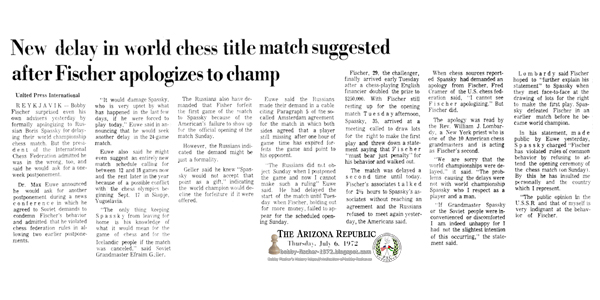New York Times, New York, New York, Wednesday, July 06, 1972 - Page 31
Some Fans in U.S. Deserting Fischer by Peter Kihss
An American professor who developed the system of ranking the world's chess players said yesterday that Bobby Fischer appeared to be losing fellow players' sympathy in what he called “a war of nerves” between Fischer and the delegation of his Soviet opponent, Boris Spassky, the world champion.
Prof. Arpad E. Elo, whose system has been accepted officially by the International Chess Federation, said in Brookfield, Wisconsin, that “the chess world is getting a little fed up,” based on reactions he found during the Fourth of July Western Open Tournament in Milwaukee.
There was “a general attitude of impatience” with Fischer among the 120 participants, Professor Elo said.
Lubomir Kavalek, one of three masters currently tied for the United States championship, said in Washington that Fischer and Spassky “have to sit down and play because there is nothing to discuss any more.”
Protest Called Too Late
Kavalek said the Soviet delegation “missed all rights” by not protesting Sunday when Fischer failed to show up for the first match. He said the Russians apparently thought Fischer would not appear at all and were thus “too clever on their side,” but, he added, he believed Spassky wanted to play and “I think everything going from the Soviet side is not Spassky's opinion.”
Professor Elo, who is now lecturing at the University of Wisconsin after retiring from Marquette University's physics department, developed a four-digit numerical ranking of players based on results in tournament and match play, which for the last two years has put Fischer first in the world's top 20—2760 to Spassky's 2690.
He said the 1972 rankings due shortly would widen the margin even more, including recent Fischer victories while Spassky had not done as well as expected in Moscow and Gothenburg, Sweden, play. If the championship match goes on in normal fashion, he said, he predicted Fischer would win in 21 games, 12½ to 8½, not needing the full 24-game series.
Computer Charge Discussed
Prof. Monroe Newborn of Columbia University's electrical engineering and computer science department, who is a developer of programming computers for chess, scouted a Soviet news report that Fischer might seek computer aid. Professor Newborn is participating in the nation's third computer chess tournament in Boston, Aug. 13 to 15.
A computer, he said, can analyze a situation and make a play in one to three minutes, but would need a whole day “to come close” to the quality of the decisions by champion players. If Fischer resorted to a computer, he added “it would be the best thing Spassky could hope for.”
Professor Newborn, like others, said Fischer had fought hard for recognition, but “I can't admire Fischer for having done what he did” in the current maneuvers. ([Under the circumstances I fully appreciate what Fischer did in retaliation for the years of Soviet meddling and their months of pre-arrangement drama.])
Sammy Reshevsky, eight-time American champion and now tied with Kavalek and Robert Byrne, said tersely, “I have some thoughts, but I don't want to say.” ([Reshevsky should recall the dissenting voices of the 1950s, when he felt the squeeze of sheer Soviet numbers pushing him out of the running, all hope qualifying for the world title challenge was regarded an impossibility for a non-Soviet.])
Leonard Marcus assistant director of another membership club, the Manhattan, predicted a Fischer victory after what he decried as “politics in chess.” He suggested “the Russians went there with the idea Fischer would not show and they could sit back and be nice guys.”
At the Chess and Checker Club, open to public play by the hour, John Fursa, proprietor, said nightly arguments have found “pros and cons about even.”
One side, he said, has been arguing that Fischer has given chess everything he has, and deserves to make the most of his first chance for “real money.” The other view, including his own, he said, is that Fischer is so certain to win that he should have played by the rules to become champion and then “write his own ticket.”
[Caption] THE SUBJECT WAS CHESS: Dr. Max Euwe, left, president of the International Chess Federation, with Yefim Geller, Boris Spassky's second, and an interpreter, right, at a news conference in Reykjavik yesterday. Mr. Geller presented Soviet match demands.
New York Times, New York, New York, Thursday, July 06, 1972 - Page 01-31
Fischer Apologizes to Spassky; Plans for Match Still Unsettled by Harold C. Schonberg
Reykjavik, Iceland, July 5 —Nobody in Iceland—neither the contestants in the scheduled world chess championship match, nor their advisers or assistants, nor officials of the International or Icelandic Chess Federations — knew tonight when the match would begin, or whether it would be held at all.
Confusion seems to be the only consistent theme on a day on which Bobby Fischer, the American challenger, apologized to the Soviet champion for delaying the match, and Dr. Max Euwe, the president of the International Chess Federation, apologized to the Russians condemned Fischer and admitted his own error in granting postponements.
The Russians, who had demanded the apologies—and in writing—had no comment. Since it was, in effect, their move, the status of the match remained uncertain.
Dr. Euwe, in an attempt to break through what has become a denser and denser impasse, proposed that the 24-game match be postponed for a week and that it be split—with six to eight games to be played elsewhere later this year.
Dr. Euwe's suggestion, made on the spur of the moment, seemed designed to allow tempers to cool. It followed the rejection of Fischer's apology by the Soviet delegation because it had been sent by messenger, it was mimeographed and it was not signed by Fischer.
At a press conference earlier today, Spassky's second, Yefim Geller, read off a list of alleged infractions of the regulations by Dr. Euwe.
He said that the match would go on only if three conditions were met:
1. “Robert Fischer must apologize.
2. “The president of FIDE [Federation Internationale des Echecs, the International Chess Federation] has to condemn the behavior of the challenger.
3. “The president of FIDE has to admit that his two-day postponement violated FIDE rules.”
A demand by the Russian Chess Federation that Fischer forfeit the first game was not among the conditions.
The Rev. William Lombardy, Fischer's second, read a statement that Fischer had authorized. Addressed to the Russian delegation, it said:
“We are sorry that the world championship was delayed. The problems causing the delays were not with world champion Spassky, whom I respect and admire as a man and a player.
“If grandmaster Spassky or the Soviet people were inconvenienced or if discomforted, I am indeed unhappy for I had not the slightest intention of this occurring.”
The letter was not signed, for Fischer dislikes putting his name on anything as much as he dislikes appearing in public. He has not been seen since he arrived Tuesday morning. Lombardy said, however, that Fischer would like to explain his side of the delay personally to Spassky.
Apology Rejected
Geller said that he had seen Fischer's apology, but that it had been sent by a messenger, it was mimeographed and not personally signed. The implication was that this was no way to tender an apology.
Dr. Euwe, looking agitated, then rose and said that since two conditions referred to him, he would be happy to write out on the spot a condemnation of Fischer “not only in the last two days but all through the negotiations.”
He said that he would also admit that he had violated FIDE rules. “There are reasons,” he said in justification. “If I had not violated the rules there would be no match.”
He signed a statement condemning Fischer's late arrival and admitted that he, Dr. Euwe, had violated FIDE rules “on the basis of assumptions proved wrong.”
The match was scheduled to begin Sunday. Spassky and his entourage showed up days before the starting. Fischer, however, twice canceled plans to fly here, went into hiding and demanded 30 per cent of the receipts in addition to a share of the $125,000 purse.
When Fischer failed to arrive for the start of the match, Dr. Euwe granted a two-day postponement but warned that Fischer would forfeit the match if he did not show up by noon Tuesday. Fischer flew here after a British millionaire added $125,000 to the purse.
In his condemnation, Dr. Euwe said Fischer had acted in an “inexcusable manner” was “living in another world.”
The Americans entered the picture with a press conference immediately after the Russian one. It was called hastily by Fred Cramer, Fischer's assistant. If there was any apologizing to be done, Cramer said, Dr. Euwe should apologize to the Americans.
Drawing Wanted
Dr. Euwe, said Cramer, broke the rules in favor of the Russians. Anyway, he added, “Bobby doesn't feel he has violated any rules.”
When pressed, Cramer said he would waive all apologies but he insisted that the drawing for the white pieces—White moves first and has an advantage—scheduled tonight between Spassky and Fischer, should go on. He did not know the time or the place of the drawing, however.
Later in the evening there was a growing feeling that positive results might come out of meetings that have been going on among the Russians, Dr. Euwe, the referee and members of the Iceland Chess Federation. It is understood that the Fischer and Euwe apologies were among the things discussed at the meetings. If an accord is reached, the match could start Sunday or next Tuesday.
[United Press International in Reykjavik quoted Dr. Euwe as saying—still later—that he felt the major outstanding differences had been settled at the meetings.
[“The match will start on Sunday, or, at the latest, Tuesday,” Dr. Euwe said according to the news agency.
[Lothar Schmid, the referee of the match, said the draw to decide who is to play the white pieces in the first game would be held at 8 P.M. (4 P.M. EDT) tomorrow.
[Dr. Euwe said a new meeting, also involving Fischer advisers, would be held tomorrow.
[He also said he felt the Soviet demand for a penalty for the American challenger for showing up late for the start of the match, originally scheduled for July 2, “might be settled later” at the FIDE Congress later this year in Skopie, Yugoslavia.
The only levity of the day came with an announcement from Moscow that a group of Americans was using a computer in New York to help the 29-year-old United States star to win. These Americans would, by unexplained means, get the moves of each game in progress, feed them into a computer, and relay them back to Fischer during the game by equally unexplained means.
The charge caused hysterical laughter among all chess specialists here, including Schmid. Even the Russians smiled when they heard the news from Moscow.
“That's nonsense,” said Dr. Schmid.
“Asinine. Pure fantasy,” said Jack Collins, former New York State champion.
“Ridiculous,” said grandmaster Larry Evans.
“Computers play average chess — very bad,” said Dr. Euwe, who was once the world champion.
The Record-Gazette, Banning, California, Thursday, July 06, 1972 - Page 10
Chess Tourney to Get Started
Reykjavik, Iceland (UPI) — The president of the World Chess Federation (FIDE) said today the much-postponed match between Bobby Fischer and Boris Spassky may finally get under way Sunday.
Dr. Max Euwe, president of FIDE, said “The match will start on Sunday or at the latest Tuesday.” He said he felt the major outstanding differences had been settled at a meeting between FIDE, the Icelandic organizers and Spassky's advisers early today.
But Lothar Schmid, the FIDE referee for the match, wasn't so optimistic. “This is if everything goes according to plan,” he said. “Things can still go wrong.”
Fischer Challenges Spassky
Fischer, a 29-year-old chess genius from Brooklyn, is challenging Spassky, a Russian for the world championship Spassky now holds. The match originally was to have started last Sunday but Fischer failed to show up in time, touching off a furor.
Schmid said the draw of lots to decide who is to play white in the first of the 24 games in the $250,000 match will be held tonight 4 p.m. EDT.
Euwe said a new meeting, also involving Fischer's advisers, will be held today.
He said he felt the Soviet demand for a penalty for the American challenger for showing up late for the start of the match “might be settled later” at the FIDE congress in Skopje, Yugoslavia.
But Schmid said the Soviet demand that Fischer forfeit the first game — and a crucial point in the battle for the world title — was still not completely solved.
One Other Point
There may also be a signed apology from Fischer. No such document has yet been presented to the Russian world champion but Euwe said he was satisfied that it would be forthcoming.
Fischer presented an apology of sorts Wednesday when he broke his silence with a statement regretting the delay of the match. Fischer said it was not Spassky's fault that the match had been delayed and said he “respected grandmaster Spassky as a player and man.”
Russian officials said the statement was expected to satisfy Spassky if delivered to him with Fischer's signature attached.
New York Times, New York, New York, Thursday, July 06, 1972 - Page 31
Russians Disdain Fischer For Concern With Money
Moscow, July 5—A Soviet newspaper editor buttonholed an American at a reception today and said:
“It is a money-grubbing society like yours that produces a Bobby Fischer. If anything like this ever happened in the Soviet Union, the pressure of public opinion would never stand for it.”
The Russian was commenting on the impasse in Reykjavik, Iceland, where the long-awaited 24-game world-chess championship match has been held up, first by the United States challengers delayed arrival and then by the refusal of the Soviet Union's Boris Spassky, the world champion, to start playing.
Apology Unreported
News of a qualified apology issued today on behalf of Fischer by his second, the Rev. William Lombardy, was not reported by the controlled Soviet media. It was assumed the form of the apology had not satisfied the Russians and that they would insist on further amends by the American challenger before agreeing to play. But this was unclear.
“He should not be allowed to get away with it,” a Russian remarked, alluding to Fischer's demand for a bigger share of the gate receipts. This demand had caused postponement of the scheduled opening of the chess match on Sunday.
It was only after James D. Slater, a London investment banker, offered $125,000 in additional prize money that the American decided to fly to Reykjavik yesterday. By then, however, Spassky insisted that the challenger be penalized for failure to start the match on time.
Some chess fans here have suggested that the present impasse be resolved by giving Spassky the first game by default on the ground that Fischer had not shown up as provided by the rules.
The American's apparent emphasis on prize money has been difficult for Russians to understand. The Soviet editor, in alluding to the ethics of capitalist society, spoke of the problem in highly ideological terms, making no allowance for personal idiosyncrasies as possible factors in Fischer's case.
But even less ideologically minded chess fans here have accused Fischer of dragging the game of chess from the lofty esteem in which it is held here to the level of betting on the horses and other money-oriented sporting events. ([And Soviet subsidization wasn't about financial and personal profit to the players? Mere love of a sport affords to put bread on the table and shelter over the head? Let's see them live without money! Why should organizers rake in the lion's share of profits?])
The Soviet media have also been critical of Dr. Max Euwe, president of the International Chess Federation, for not adopting a sterner attitude toward Fischer's actions. ([Perhaps like Belgrade, make up rumors, and spread them in hopes of disqualifying Fischer and replacing with a Soviet?])
Reflecting a growing impatience over what has been viewed by Soviet officials as kid-glove treatment given to Fischer by the world federation, the Government newspaper Izvestia published a letter tonight under the headline “How Much More Can Anyone Fuss?” ([Indeed. Creating drama, a fuss and squabble seems all that the USSR, Belgrade and Reykjavik have accomplished up to this point between themselves. Fischer has said very little actually. You know, how they always repeat the lines how Fischer altogether avoids reporters and won't grant interviews…?])
The letter, by members of the chess club of Moscow's big Likhachev automotive plant, said:
“The officials of the world federation contend that they are concerned mainly with the game of chess and preservation of sportsmanship in the conduct of all matches. One of the most effective contributions they could make to the sportsmanlike purity of chess is to call Fischer to order. He has been openly introducing into the game a spirit of sordid utilitarianism, money-grubbing and tactlessness.” ([And those who have came from the former Soviet Union, have not?])
The Newark Advocate Newark, Ohio Thursday, July 06, 1972 - Page 19
Dawdling Chessmen to Play . . . Sometime
Reykjavik, Iceland (AP) — International chess chief Max Euwe proposed another delay Wednesday night in the Bobby Fischer-Boris Spassky world championship match as the maneuvering and confusion continued in Reykjavik. There was no immediate response from Fischer or the Russians, and it was not known whether the twice-postponed match would start today.
Euwe, president of the International Chess Federation, said he didn't penalize Fischer for his late arrivals in Iceland because the American challenger is “living in another world.” ([Indeed he is, and that world he naively believes in, promotes at the forefront of national law, concepts like “Freedom” and “Justice” a thing the Soviet has long forbidden to its own citizens. Speaking of Capitalism, for the Soviets “Winning is Everything” no expense spared, including endangering the lives of their athletes, maneuvering for unfair advantage against their opponents, and at what high costs? and who pays?]) He said Spassky, the Russian world title holder, was “very upset” and that he would like to give him another week before the first game.
Euwe also admitted he had violated the rules in allowing two previous postponements in the start of the match. He promised strict rule enforcement in the future.
The 24-game series between Fischer and Spassky had been scheduled to start Sunday. Fischer stayed in New York, holding out for more money, and Euwe postponed the start of the match until Tuesday. Fischer arrived that day, but the Russians objected to his conduct and Euwe put the start off until today.
Fischer apologized Wednesday for delaying the start of the match, but the Russians demanded apologies in writing. Then they demanded that Fischer forfeit the first game.
The American's apology, read by a spokesman at a news conference, said: “We are sorry the world championship was delayed. The problems causing the delays were not with world champion Spassky whom I respect as a man and admire as a player.”
Later Yefim Geller, the Soviet grandmaster, acting as Spassky's second, told another news conference the Russians wanted Euwe to condemn the American's conduct and accept blame himself for violating the federation's rules.
Euwe came forward and condemned Fischer, conceded he himself had broken the rules and added: “I apologize.”
Asked if the Russians were satisfied, Geller said they wanted it all in writing. ([To print in Soviet-censorship controlled press, for official propaganda purposes. Not a word uttered about months of the Soviet Rumor Mill attempts to disqualify Fischer and replace with Petrosian, or their choice to ignore flagrant Icelandic racism, and selecting Iceland as the host site, for 1) its offer as the lowest bid, discouraging competition against the Soviet monopoly on sports titles, 2) inadequate technology to facilitate world broadcast of the event, a blatant attempt to bury coverage, 3) A Pro-Soviet, anti-American atmosphere to demoralize the opponent; etc.]) Euwe took a pen from his pocket and said, “I can write it now,” and began drafting a letter.
Geller then said the Soviet Chess Federation had told Euwe he should award the first game to Spassky by forfeit, but Euwe said he did not consider the request official.
Then Euwe put forward his idea of another postponement.
The Lincoln Star Lincoln, Nebraska Thursday, July 06, 1972 - Page 15
Start Of World Chess Championship Reset
Reykjavik (UPI) — The Boris Spassky-Bobby Fischer, world chess championship match will open Sunday or Tuesday at the latest, the president of the International Chess Federation (FIDE) said early Thursday.
FIDE President Dr. Max Euwe said he felt the major outstanding differences had been settled at a meeting between FIDE, the Icelandic organizers and Spassky's advisers ending early Thursday.
“The match will start on Sunday or at the latest Tuesday,” Dr. Euwe told newsmen.
But Lothar Schmid, the FIDE arbiter of the match, warned that “this is if everything goes according to plan. Things can still go wrong,” he added.
Schmid said the draw of lots to decide who is to play white in the first of the 24 games in the $250,000 match will be held at 8 p.m. (4 p.m. EDT) Thursday.
Dr. Euwe said a new meeting, also involving Fischer advisers, would be held Thursday.
He also said he felt the Soviet demand for a penalty for the 29-year-old American challenger for showing up late for the start of the match, originally scheduled for July 2, “might be settled later” at the FIDE congress later this year in Skopje, Yugoslavia.
But Schmid said the Soviet demand that Fischer loses the first game —and a crucial point in the battle for the world title—was still not completely solved.
Chess sources said Gudmundur Thorarinsson, president of the Icelandic Chess organization was communicating with the Soviet chess federation in Moscow concerning the demand.
One other point to be settled is Spassky's demand for an apology from Fischer with the American's signature on it. No such document has yet been presented to the Russian world champion, but Dr. Euwe said he was satisfied that it would be forthcoming.
Fischer presented an apology of sorts Wednesday when he broke his silence with a statement regretting the delay of the match. Fischer said it was not Spassky's fault that the match had been delayed and said he “respected grandmaster Spassky as a player and man.”
Russian officials said the statement was expected to satisfy Spassky if delivered to him with Fischer's signature attached. ([For purposes of the Soviet Propaganda Machine.])
Dr. Euwe already fulfilled two other Soviet demands ([Already, the mile long list of Soviet Federation “demands” and Moscow rumor mill far outweigh any of Fischer's actions …]) Wednesday night when he issued condemnation of Fischer's behavior in failing to turn up in time and also admitted that he himself had violated the FIDE rules by granting a postponement of the first match.
Euwe said the Russians made their demand in a cable citing paragraph 5 ([Oh those lawyers and the legalese! Why does the Soviet Federation put so much trust in lawyers instead of fellow chess players such as Fischer? back at the earlier criticism of Vlastimil Hort!]) of the so-called Amsterdam Agreement for the match in which both sides agreed that a player still missing after one hour of game time has expired forfeits the game and point to his opponent. ([Both Sides? One side, which forbid Spassky to travel to review the agreement and the other side, here noted as the “so-called” agreement, because Fischer never signed the thing. Further, he rescinded Edmondson's authority, who was formerly acting as representative. Re-negotiations never took place and organizers refused to set down with Fischer and work out these details, prior to the engagement.])
“The Russians did not object Sunday when I postponed the game and now I cannot make such a ruling” Euwe said. He had delayed the start of the match until Tuesday when Fischer, holding out for more money, failed to appear for the scheduled opening Sunday.
Fischer, 29, finally arrived early Tuesday after a chess playing English financier doubled the prize to $250,000. With Fischer still resting up for the opening match Tuesday afternoon, Spassky, 35, arrived at a meeting called to draw lots for the right to make the first play, threw down a statement saying that Fischer “must bear just penalty” for his behavior and walked out.
The match was delayed a second time until Thursday. Fischer's associates talked for 2½ hours to Spassky's associates without reaching an agreement and the Russians refused to meet again Wednesday, the Americans said.
When chess sources reported Spassky had demanded an apology from Fischer, Fred Cramer of the U.S. Chess Federation said, “I cannot see Fischer apologizing.” but Fischer did.
The apology was read by the Rev. William J. Lombardy, a New York priest who is one of the 10 American chess grandmasters and is acting as Fischer's second.
“We are sorry that the world championships were delayed,” it said. “The problems causing the delays were not with World Champion Spassky who I respect as a player and a man.
“If Grandmaster Spassky or the Soviet people were inconvenienced or discomforted I am indeed unhappy for I had not the slightest intention of this occurring,” the statement said.
Lombardy said Fischer hoped to “further explain his statement” to Spassky when they met face-to-face at the drawing of lots for the right to make the first play. Spassky defeated Fischer in an earlier match before he became world champion.
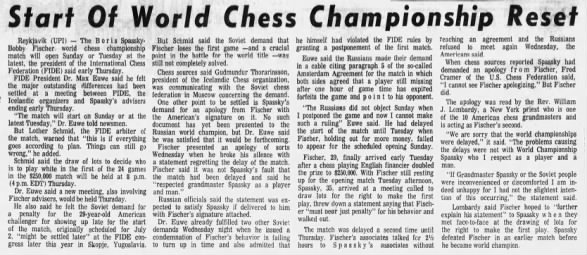 Start of World Chess Championship Reset 06 Jul 1972, Thu The Lincoln Star (Lincoln, Nebraska) Newspapers.com
Start of World Chess Championship Reset 06 Jul 1972, Thu The Lincoln Star (Lincoln, Nebraska) Newspapers.com
The Boston Globe Boston, Massachusetts, Thursday, July 06, 1972 - Page 53
Fischer Contrite, Chess Match Set (Starts Sunday or Tuesday) by Harold Dondis, Globe Staff
Reykjavik, Iceland — Another in the endless lines of hurdles has been crossed and the world chess championship will start either Sunday or next Tuesday.
Lothar Schmid, arbiter of the match said the draw of lots to decide who is to play white in the first of the 24 games in the $250,000 match will be held at 8 p.m. (4 p.m. EDT) today.
Bobby Fischer, the late arriving American who is recognized by most experts as the world's greatest player, in a rare show of humility apologized to world champion Boris Spassky, the disgruntled Russian.
In a written apology to Spassky and Soviet grandmaster Yefim Geller, Fischer said he was sorry he insulted Spassky and the Soviet people by disrupting the championship.
But the Russians have toughened their stand. Russian domination in the chess world that dates back to 1948 is seriously threatened if both sides finally agree to the 24-game match that should be finished sometime before Christmas.
The president of the International Chess Federation, Dr. Max Euwe, sharply condemned the American challenger and had suggested the match be put off so that Spassky can regain his composure after so many anxious days of waiting for Fischer.
“He's living in another world,” said Dr. Euwe of Fischer. There is a possibility the match will have to be split into two parts so the world championship could be played in Skopje, Yugoslavia, starting Sept 18.
Dr. Euwe wrote a confession of abject guilt for allowing the delay. “I violated the rules, I apologize. I'm very guilty,” he said.
The Russians, who wanted Fischer to forfeit the first match, also demanded the president condemn the 29-year-old American which he did quickly. “Is there anyone who would not condemn Fischer?” he asked. “Even his friends say his behavior is inexcusable.” ([And who doesn't condemn the Soviets for their selection of a racist haven, as the site of the 1972 world chess match? No condemnation by FIDE, Iceland forbid black personnel to serve on Icelandic soil? That's for starters of a long winding list of “apologies” that should be forthcoming from all penitent parties involved.])
Redlands Daily Facts Redlands, California Thursday, July 06, 1972 - Page 7
Fischer Apologizes, Chess Match May Start on Sunday
Reykjavik, Iceland (UPI) — American chess challenger Bobby Fischer apologized in writing to the Soviet's Boris Spassky today for delaying the start of their scheduled 24-game world championship match and suggested they get on with the twice-postponed tournament without delay.
The action apparently cleared the way for the match to begin Sunday, one week behind schedule.
“I am still waiting for a telephone call from Spassky's camp that all their conditions have been met, but I am quite sure the match will now start Sunday,” said match referee Lothar Schmid.
Earlier reports that Fischer hand-delivered the note to Spassky were incorrect. “Fischer and Spassky have not yet met in person,” said a Fischer aide.
“Please accept my sincerest apology for my disrespectful behavior in not attending the opening ceremony. I have offended you and your country, the Soviet Union, where chess has a prestigious position,” Fischer's note said.
Fischer also asked Spassky to get the Soviet chess federation to drop its demand that he forfeit the first game to Spassky because he was not present for a meeting to draw lots to see who would get the first move.
The move apparently cleared the way for the twice-postponed match to begin Sunday, one week behind schedule.
The match was postponed the first time because Fischer stayed in New York to bargain for more prize money.
“I simply became carried away by my petty dispute over money with the Icelandic chess organizers,” Fischer's note said.
“I know you to be a sportsman and a gentleman, and I am looking forward to some exciting chess games with you,” Fischer said.
His note also said he would be at a disadvantage if he was required to forfeit the first game “and I don't believe the world champion desires such an advantage in order to play me.”
Fischer also apologized to Dr. Max Euwe, president of the International Chess Federation (FIDE), for delaying the proceedings. Euwe ordered the first postponement at Fischer's request.
Euwe said earlier the match could start Sunday, or by Tuesday at the latest. He said representatives of Fischer and Spassky apparently ironed out other differences.
The Danville Register Danville, Virginia Thursday, July 06, 1972 - Page 1
Further Postponement Suggested: Fischer Apologizes For Chess Delay But Russians Want It in Writing
Reykjavik, Iceland (AP) — Bobby Fischer apologized Wednesday for delaying the start of the $250,000 world championship chess match, but the Russians demanded apologies in writing.
Takes Some Of Blame
With the confrontation threatening never to reach the checkered board, President Max Euwe of the International Chess Federation—FIDE—took some of the blame and suggested a further postponement until next week for the dust to settle.
Euwe said he had allowed Fischer's tardy arrival—he got here Tuesday—because “Fischer is quite another person. He's living in another world.” Euwe said he realized titleholder Boris Spassky was “very upset” and would like to give him a week before the first game.
At Stake
Fischer's holdout for more money brought takings for both winner and loser to the highest amount ever in world championship chess. The winner will get $231,250 and the loser $168,750.
The 24-game series between Spassky of the Soviet Union and the 29-year-old American challenger was to have begun last Sunday. It was put off for two days because of Fischer's holdout, then delayed until Thursday by Soviet objections to the American's conduct.
Promise To Be Strict
Euwe admitted Wednesday he had violated the rules in allowing delays in the starting date, and promised strict rule enforcement from now on, He then suggested the further postponement and said the match may even have to be split into parts to avoid conflict with the world chess Olympiad set to begin in September at Skopje, Yugoslavia.
The first apology of the day was made in Fischer's name on the demand of Spassky, who said the American's conduct had “insulted me personally and the country I represent.”
He's Sorry
Fischer said he was sorry he'd caused any trouble for Spassky, who he respected as a man and admired as a chess player.
The Russians, unsatisfied, demanded his excuses in writing.
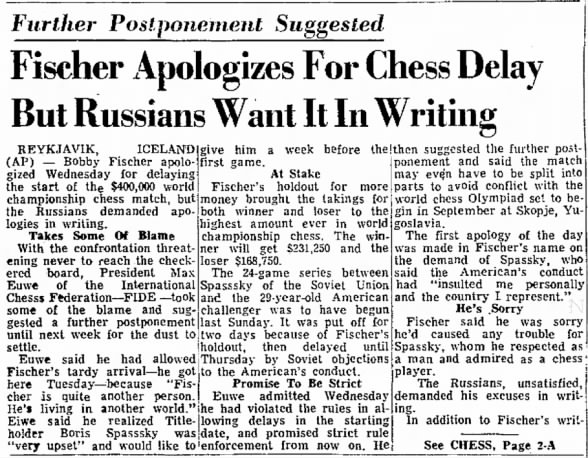 Further Postponement Suggested: Fischer Apologizes For Chess Delay But Russians Want It in Writing 06 Jul 1972, Thu The Danville Register (Danville, Virginia) Newspapers.com
Further Postponement Suggested: Fischer Apologizes For Chess Delay But Russians Want It in Writing 06 Jul 1972, Thu The Danville Register (Danville, Virginia) Newspapers.com
 Chess 06 Jul 1972, Thu The Danville Register (Danville, Virginia) Newspapers.com
Chess 06 Jul 1972, Thu The Danville Register (Danville, Virginia) Newspapers.com
In addition to Fischer's written apologies, the Soviets wanted Euwe to condemn the American's conduct and accept blame for violating FIDE rules.
This happened at a news conference called by Yefim Geller, the Soviet grandmaster acting as Spassky's second. Speaking for the absent world champion, Geller said Spassky would return home if the demands were not met.
Geller spoke hours after Fischer had declared he was sorry.
One of the packed audience in a hotel bar stepped Euwe, a tall, 71-year-old Dutchman and former world chess champion. He made his way to the speaker's table, and sat down at Geller's right.
Taking a microphone from the table in front of him, Euwe said he condemned Fischer, conceded he had broken the rules and added: “I apologize.”
Asked by a newsman if the Russians were satisfied, Geller said they wanted it all in writing.
Euwe reached to his inside pocket for a pen and said, “I can write it now.” He began drafting a letter as the news conference continued.
At one point, Geller confirmed that the Soviet Chess Federation had told Euwe should award the first game of the match to Spassky by forfeit. Euwe looked up from his paper and said he didn't consider the request to be official.
Geller, smiling as the questioning turned in circles, said he didn't think Spassky would accept the award even if Euwe offered it.
Do the Russians insist on it anyway? “Yes,” Geller said.
When it appeared that the Soviets would be ready to start play Thursday, assuming Fischer's written apologies were in hand, Euwe created a new tangle.
After explaining why he allowed Fischer the delay, Euwe said: “I know Spassky is very upset by all this, and I would not like to make him play tomorrow,” Euwe said.
“I would like to give him a week. Then we'd have to split the match into 12-game halves. The second part could come later in the year. Or we could have 16 games now and the rest afterward.”
Fulfillment of the Russian demand that Fischer forfeit the first game would give Spassky a 1-0 score advantage in the score at the outset. The 24 games are scored one point for a win, a split point for a draw and nothing for a loss. Spassky needs 12 points to retain his title. Fischer 12.5 to defeat him.
Chess experts said that in such a long match a lost point was a disadvantage Fischer probably could overcome at the Italian marble chess board on the stage of Reykjavik's 2,500-seat Sports Palace.
From the frequent trips by Spassky and Geller to the gray three-story Soviet Embassy here, it was apparent the Soviet pre-match game was being played on directives from Moscow.
The maximum aim of the Soviet officials could be to obtain an initial scoring advantage that hopefully would permit the title to stay in Russia. The title has been won by Soviet players since 1948 in competitions that paid well in prestige, but only a few thousand dollars in money.
Or they might be playing more modestly to regain the psychological advantage for their champion. This would mean that in the end they would accept a decision by Euwe not to penalize the American.
The Los Angeles Times Los Angeles, California Thursday, July 06, 1972 - Page 22
Chess Match Could Start Next Week; Russ Seek Game Point by Joe Alex Morris, Jr.
Reykjavik, Iceland — The president of the International Chess Federation sharply condemned American challenger Bobby Fischer Wednesday. But after a midnight conference he said that the controversial world championship match probably could start Sunday or Tuesday.
Certain important problems still remained, not the least being a demand by the Russians that Soviet world champion Boris Spassky be awarded one point and the first game because they say Fischer defaulted.
The Russians reiterated this demand in the late evening after appearing earlier to accept the viewpoint that it not be made a major issue.
Another problem was an apology Fischer made to satisfy Russian demands. The Russians want it in writing, and they want Fischer's signature on it, said arbiter Lothar Schmid.
Dr. Max Euwe, president of the International Chess Federation, earlier had complied with Soviet demands he issue a sharp rebuke to the 29-year-old American challenger who arrived two days late for what has been billed as the chess match of the century.
“He's living in another world,” the elderly Dutch former world champion said of Fischer.
Euwe described Spassky as “very upset” and proposed postponing the match until Sunday or Tuesday. This would put it behind schedule and possibly necessitate splitting the 24-game competition into two parts so that the world chess Olympiad could be played in Skopje, Yugoslavia, starting Sept. 17.
The chess Olympics are held once every two years, and the players here would be expected to head their respective national teams in Yugoslavia. The officials now here also would be expected to be there because simultaneously with the chess Olympiad the International Chess Federation will hold its regular elections.
It was a day of apologies by both Euwe and Fischer which seemed to go far toward meeting Russian demands for satisfaction over what they described as gross violations of the rules and an insult to both Spassky and the Russian people.
“We see no guarantees that the rules won't be violated again,” said Soviet grand master Efim Geller. And he added there were still many questions to be solved.
Fischer left his luxury bungalow and went on a 5 a.m. ride Wednesday with a police guard. He tried to get into the hall where the match is to be played, but it was locked.
The American's apology to Spassky was hardly copious, for he said merely: “If grand master Spassky or the Soviet people were inconvenienced or discomfited, I am indeed unhappy, for I had not the slightest intention of this occurring.”
Spassky in his protest note had said Fischer's antics “called in doubt his moral rights to play the match,” adding, “If there now is to be any hope for conducting the match, Fischer must be subjected to just penalty.” In an accompanying blast at Fischer and Euwe, the Russians demanded sanctions be imposed against Fischer.
Fred Cramer, the unofficial American spokesman, said afterward, “Bobby doesn't feel he's violated any rules.”
There was a curious runaround on a Soviet Chess Federation demand that Spassky be awarded one point for the first game as punishment to Fischer for his delaying tactics. Grand master Geller said the demand was still valid. Then, Euwe said “Spassky would never take this point,” and Geller agreed with him.
But Geller insisted the federation had to make the gesture of offering it to Spassky. Cramer said he didn't see anything wrong with that, so long as the Russian promised not to take the point.
The Russians called a press conference largely because Euwe had failed to distribute a statement they wanted, released Tuesday. Euwe explained he couldn't because the translations didn't jibe with the Russian text. But on inspection, the difference appeared relatively minor.
It gave Geller a chance to blast not only Fischer but the federation as well because it had not condemned Fischer “but did the reverse—it took him under its protection.”
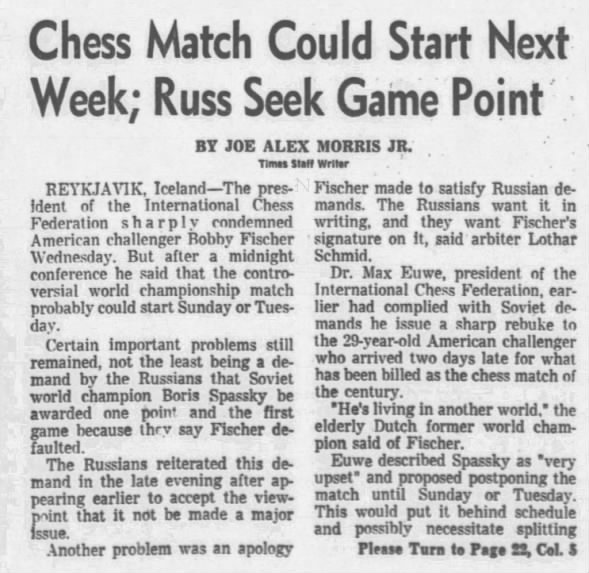 Chess Match Could Start Next Week; Russ Seek Game Point 06 Jul 1972, Thu The Los Angeles Times (Los Angeles, California) Newspapers.com
Chess Match Could Start Next Week; Russ Seek Game Point 06 Jul 1972, Thu The Los Angeles Times (Los Angeles, California) Newspapers.com
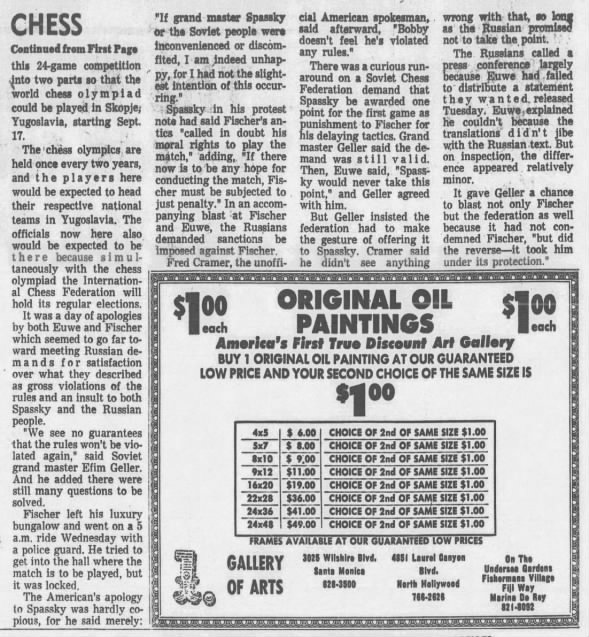 Chess 06 Jul 1972, Thu The Los Angeles Times (Los Angeles, California) Newspapers.com
Chess 06 Jul 1972, Thu The Los Angeles Times (Los Angeles, California) Newspapers.com
The Anniston Star, Anniston, Alabama Thursday, July 06, 1972 - Page 5
Fischer Irks Icelanders by Joe Alex Morris, Jr., Star-The Los Angeles Times
Reykjavik, Iceland — “We like Americans here, not Russians.” the pretty telephone operator said ([they do not like Russians, but they love the Soviet Union and its Anti-American bigotry. They also, do not like black personnel and have a secret agreement with U.S. Military to limit the number of black Americans, allowed to serve on the NATO base at Keflavik.])
“But we don't like your Mr. Fischer. We will be rooting for Spassky.” ([Of course they root for Soviets, whilst Pro-Soviet, Anti-American, Anti-Fischer. This is WHY USSR chose Iceland, with their overt, flagrant racism against Black American personnel, and decades of Anti-American publications circulated by the 10% Soviet Icelandic population. History this “Chess Mafia” worked in concert to cover-up.])
For many Icelanders, Bobby Fischer has become the latest version of the ugly American. The 29-year-old challenger for the world chess crown and his team of advisers have been collecting bad publicity ever since Fischer missed his first plane to Iceland a week ago. ([And Fischer made a brilliant move, by rebuffing months of Soviet maneuvers and meddling.])
Fischer has done it with his obstinate and — to some — arrogant demands for more money. ([How grieved was Moscow, at the thought, Fischer inherit a red dime for breaking their monopoly.])
In contrast, the Russian Boris Spassky has been a real all-American guy. ([How? With the Soviet forbidding him to travel to the prematch conference in Amsterdam to iron-out details in person with Fischer? With the Soviet putting Spassky on ice, to make all decisions as he stands by in silence? While they instruct him, order by Draconian order, what to say, how to act, controlling every move he makes on and off the chessboard?]) He plays tennis, talks to the press and drives around in a Ford Bronco, a jeep-type vehicle ([Does not freedom of speech make.])
HE BUILT HIMSELF a sympathetic public here while Fischer ([Wrong. The Soviet selected Iceland due to lack of modern communications to limit coverage of the match. The anti-American, racist atmosphere began decades, long before… when Fischer was a mere babe, fostered by the 10% Soviet underbelly in the Icelandic population, and their Anti-American publications. To keep the people divided, and conquered. The Soviet champion would've been Satan himself, and Icelanders would've been rooting for the USSR either way]) sulked in New York ([called the Soviet “Chess Mafia” bluff! as the millions of fans worldwide, including Russians, had no interest in seeing another Soviet vs Soviet world chess tournament … and nations around the world were offering as high as 225,000 dollars to host the match. The Soviet forced its will on the chess world, using its influence to nudge out Australia and Mexico's high bids, to settle for racist Iceland's smallest layout. Fischer checkmated and equalized their asinine move, raising the stakes to what Australian backers would've antied up, had Euwe kept his word to offer the first half of the matches on a “first come, first serve” bid basis, when Belgrade backed out]), Monday night he received an enthusiastic ovation when he attended a soccer match and sat next to the Icelandic president. ([Would it have been any different had Fischer shown on schedule? No. Because the Anti-American underbelly, Soviets, spreading their Anti-Americans publications were well-established since the 1950s, along with their secret, racist policies and agreements forbidding black American military personnel to serve on Icelandic soil. The Soviet Union was fully aware of these dynamics, and that by bringing the match to Iceland would create an atmosphere to demoralize Fischer and his aides, whilst playing favorably for the benefit of the USSR. In consideration of their choice of flagrantly racist Iceland to host the tournament, it provides further evidence their boycott of South African Apartheid, years later, was merely a publicity stunt. Soviet Political Antics lacking sincerity.])
A great deal of this is gut reaction, and perhaps unfair to Fischer. Four years ago, a chess world championship win was worth very little. The pot for this match is now $250,000, plus 60 per cent of television and film rights.
But, like the Olympic games, the Fischer challenge has made chess a quasi-political affair. He is the first threat to Soviet domination in decades, and this championship match has taken on certain aspects of the big power struggle.
Not that such considerations both Bobby. “He doesn't worry about such things,” said Fred Cramer, an executive of the American Chess Federation.
Fischer doesn't say anything to anyone, ([snipping the false claim that Fischer ever sold exclusive interview rights to Life magazine. Said Fischer to the New York Times on September 23, 1972: “Fischer told a reporter that the story that he had sold Life Magazine an exclusive interview during the match with Spassky was ‘a dirty lie.’” ‘I was busy,’ he said. ‘If I'd given an interview to every body that asked, I'd have lost the match.’” - New York Times, 9/23/1972.(https://www.nytimes.com/1972/09/23/archives/city-says-hail-to-bobby-fischer-champion-gets-gold-medal-and-makes.html))
IN THE LATEST EXAMPLE, Cramer told the newspaper Timinn, Wednesday that 80 per cent of the Icelanders want Fischer to win. Nothing would appear to be further from the truth: In countless conversations since Bobby's first abortive attempt to fly here was beaten back by photographers in New York, this correspondent has yet to find one Icelander sympathetic to him. ([Because of the decades of an Icelandic, Anti-American underbelly, fostered by the 10% Soviet population, and their pro-Soviet publications…])
“I hope he stays home,” said a businessman shortly before Fischer finally made the flight over.
The American image was hardly improved by the case of the invisible cables. There were two of them, one supposedly from the American Chess Federation, the other from a Dr. Anthony Said, said to be a friend of Fischer's.
Both were allegedly sent to Fischer's unofficial representatives here, and both purportedly supported demands made for a postponement of the match. Neither cable arrived, and to top it all, Bobby said in New York he wasn't ill.
His representatives here had gone to International Chess Federation president Dr. Max Euwe pleading illness on Fischer's part, in asking for a two-day delay. ([But WHY should Soviets be so upset by “imaginary cables,” when their “Chess Mafia” in Belgrade printed a whole “White Book” on imaginary cablegrams, according to Robert Byrne, who put it best: as Fischer “allegedly said” and “quoted Fischer as saying” without producing a single, verifiable cablegram! As in reproductions, and verification by the telegraph agency, nada. The press never bothered to investigate the false claims of the “Chess Informant” magazine who produced this defamatory rubbish… however, Ed Edmondson confirmed in his numerous interviews with western press around April 1972, that the Soviet and Belgrade organizers were at fault for making false claims, patently untrue, and an absolute failure to meet with Fischer to iron-out prematch details… going so far as forbidding Spassky to travel, to work out the details between himself and Fischer. Fischer's friend, Ken Smith, offered documentation of a plot to disqualify and replace Fischer with a Soviet (mentioned in chess columns from April 23, 1972). Throwing a “deadline” at Fischer, to agree to a contract he'd never even seen or had opportunity to review, and only learning of said deadline through third party newspaper reports! No effort was spared by Soviet “chess mafia,” to avoid communication, and to seek an unfair advantage and disqualification of Fischer, pre-tournament.])
Nothing seem to embarrass them. In addition to Cramer, they include three men who talk only to the International Chess Mafia, here in strength, of course.
ONE IS A CHUBBY priest named William Lombardy, a former junior chess champion inclined to grandiose phraseology of little substance. Speaking of the American negotiations with the Russians, he says things like, “We've opened up areas of communication I never thought possible.”
But he doesn't say what he means, and the Russians didn't understand either.
Another is a lawyer named Paul Marshall. “Answering questions won't help anyone,” he said curtly when reporters tried to ask him about the talks with the Russians.
All in all, the Americans add up to a great team — for Spassky. And he needs them, for his own people back in Moscow have been up to their usual heavy-handed nonsense.
After a fortnight in which he built up his nice-guy image, Spassky almost had it shot out from underneath him. The Soviet chess federation opened up its big guns against not only Fischer but Euwe, the Dutch President of the International Chess Federation, and a man in way over his head in the current crisis.
Spassky himself put out a statement, considerably more restrained than the noises from Moscow. It appeared to some, including Euwe, that Spassky was simply going through the motions of protest after getting orders from Moscow.
THE SOVIET CHAMPION is something of an outsider. He is not a member of the Communist party, and drives about the streets of Moscow in a Volvo.
Men at the top can get away with this in the Soviet Union. But Spassky is under considerable pressure to beat Fischer, and his whole way of life could be influenced by whether he retains his crown or not.
Spassky has not played well recently, and his international rating is now lower than Fischer's. Despite this, he has kept his courteous cool during trying days while Bobby Fischer remained closeted in New York and his representatives here bumbled from one disaster to another.
Fischer may well emerge as the next world champion. His public image here may even improve during the 24-game competition, but in the meantime, it's been rough going. He and Spassky still haven't sat down to the chess board, and the ugly American image is still predominant.
In fact, it appeared to worsen Wednesday, as Cramer held a farcical press conference, the last in a day of weary and confusing meetings of the press with Russians, chess federation officials and Icelanders.
SPEAKING AFTER EUWE had formally condemned Fischer's behavior, Cramer said blandly, “Bobby doesn't feel he's violated any rules.” ([Probably not, because Soviets made up the rules as they went along, recognizing only those rules which played favorably in their behalf, ignoring rules which did not, including whether said ”rules“ extant rules, or not. In the pithy words of another reporters, reference was made to Soviets quoting the “so-called Amsterdam Agreement,” which had since, been invalidated, and a new contract drawn, in its place, without Fischer's signature, to base their circus of “demands” upon.])
He scoffed at the Soviet complaint that Fischer had missed the opening ceremony Saturday, describing it as “a musical concert with speeches in Icelandic which he wouldn't have understood.” ([Bobby had a history of avoiding such ceremonial pre-match activities, before and after tournaments, often arriving fashionably late, showing up only in ample enough time to make his move on the chess board. Was this anything new? He also avoided celebrations of Christmas, Easter, Birthdays, Valentine's Day, and a whole smorgasbord of activities ….]) Everyone else, including the president of Iceland, took the trouble to attend.
To top it all off, Cramer demanded an apology from the International Chess Federation, saying it broke the rules by agreeing to a Russian request that the drawing for the first game be postponed.
The press corps stumbled from the auditorium, not knowing whether to be angry or simply dumbfounded by this performance. An American grand master declared angrily: “We must get rid of him.”
It was at least a week too late, however, to repair the damage done here. ([95% of that so-called “damage” is due to Soviet finagling of choosing the Icelandic location with its deeply-rooted, Anti-American hostilities, fueled by Soviet antagonists, and their comrades in arms, from Moscow. Nobody seems interested to mention however, the Soviet approval, that black American service men will not grace the World Chess Championship, because Iceland had its secret agreements with the NATO military installation at Keflavik, forbidding Persons of Color on their soil. If they can “look the other way” from racist discrimination, they'll “look the other way,” from any flagrant injustice.])
The Arizona Republic Phoenix, Arizona Thursday, July 06, 1972 - Page 10
New Delay in World Chess Title Match Suggested after Fischer Apologizes to Champ
(UPI) Reykjavik — Bobby Fischer surprised even his own advisers yesterday by formally apologizing to Russian Boris Spassky for delaying their world championship chess match. But the president of the International Chess Federation admitted he was in the wrong, too, and said he would ask for a one-week postponement.
Dr. Max Euwe announced he would ask for another postponement during a news conference in which he agreed to Soviet demands to condemn Fischer's behavior and admitted that he violated chess federation rules in allowing two earlier postponements.
“It would damage Spassky, who is very upset by what has happened in the last few days, if he were forced to play today.” Euwe said in announcing that he would seek another delay in the 24-game match.
Euwe also said he might even suggest an entirely new match schedule calling for between 12 and 18 games now and the rest later in the year because of a possible conflict with the chess Olympics beginning Sept. 17 in Skopje, Yugoslavia.
“The only thing keeping Spassky from leaving for home is his knowledge of what it would mean for the game of chess and for the Icelandic people if the match was canceled,” said Soviet Grandmaster Efraim Geller.
The Russians also have demanded that Fischer forfeit the first game of the match to Spassky because of the American's failure to show up for the official opening of the match Sunday.
However, the Russians indicated the demand might be just a formality.
Geller said he knew “Spassky would not accept that point as a gift,” indicating the world champion would decline the forfeiture if it were offered.
Euwe said the Russians made their demand in a cable citing Paragraph 5 of the so-called Amsterdam agreement for the match in which both sides agreed that a player still missing after one hour of game time has expired forfeits the game and point to his opponent.
“The Russians did not object Sunday when I postponed the game and now I cannot make such a ruling” Euwe said. He had delayed the start of the match until Tuesday when Fischer, holding out for more money, failed to appear for the scheduled opening Sunday.
Fischer, 29, the challenger, finally arrived early Tuesday after a chess-playing English financier doubled the prize to $250,000. With Fischer still resting up for the opening match Tuesday afternoon, Spassky, 35, arrived at a meeting called to draw lots for the right to make the first play and threw down a statement saying that Fischer “must beat just penalty” for his behavior and walked out.
The match was delayed a second time until today. Fischer's associates talked for 2½ hours to Spassky's associations without reaching an agreement and the Russians refused to meet again yesterday, the American said.
When chess sources reported Spassky had demanded an apology from Fischer, Fred Cramer of the U.S. chess federation said, “I cannot see Fischer apologizing.” But Fischer did.
The apology was read by the Rev. William J. Lombardy, a New York priest who is one of the 10 American chess grandmasters and is acting as Fischer's second.
“We are sorry that the world championships were delayed,” it said. “The problems causing the delays were not with world championship Spassky who I respect as a player and a man.
“If Grandmaster Spassky or the Soviet people were inconvenienced or discomforted I am indeed unhappy for I had not the slightest intention of this occurring,” the statement said.
Lombardy said Fischer hoped to “further explain his statement” to Spassky when they met face-to-face at the drawing of lots for the right to make the first play. Spassky defeated Fischer in an earlier match before he became world champion.
In his statement, made public by Euwe yesterday, Spassky charged “Fischer has violated rules of common behavior by refusing to attend the opening ceremony of the chess match (on Sunday). By this he has insulted me personally and the country which I represent.
“The public opinion in the U.S.S.R. and that of myself is very indignant at the behavior of Fischer.
The Minneapolis Star Minneapolis, Minnesota Thursday, July 06, 1972 - Page 22
Fischer Apologizes; Chess Start Scheduled
Reykjavik, Iceland (AP) — Bobby Fischer sent a written apology to Boris Spassky today. Organizers of the world chess championship match said the two will meet for their first game Sunday night.
The American challenger, in a letter delivered by hand this morning to the world chess champion from the Soviet Union, apologized for his “disrespectful behavior.”
Fischer, whose delayed arrival doubled the prize money for both him and Spassky but also started an avalanche of confusion, asked the Russian to “accept my sincerest apology.”
“I simply became carried away by my petty dispute over money with the Icelandic chess organizers,” he wrote.
The written apology was a chief condition posed by the Soviet before Spassky would play.
Fischer told Spassky: “I have offended you and your country, the Soviet Union, where chess has a prestigious position.”
The American also apologized to Dr. Max Euwe, president of the International Chess Federation, the Icelanders, “the thousands of fans around the world and especially to the millions of fans and the many friends I have in the United States.”
However, Fischer brushed aside a demand from the Soviet Chess Federation that he forfeit the first match because of his tardy arrival. He said this “would place me at a tremendous handicap” and he didn't believe the “world's champion desires such an advantage in order to play me.”
“I know you to be a sportsman and a gentleman, and I am looking forward to some exciting chess games with you,” Fischer concluded.
Tampa Bay Times St. Petersburg, Florida Thursday, July 06, 1972 - Page 1
Strict Rules Guide Chess Championship
Reykjavik (UPI) — A world chess championship match is played under strict and detailed rules issued by the International Chess Federation (FIDE).
The match includes 24 games with the winner getting one point for each game won. In a draw, the players get half a point each. No point is given for a loss.
The match is discontinued when one of the players has reached 12.5 points. He is then the world champion. The defending world champion retains his title in case of a 12-12 tie.
In theory each game may go on forever. The first playing session lasts for five hours during which each player is forced to make 40 moves in 2½ hours. If the game is still undecided after five hours the game is adjourned until the following day. The time is then 16 moves per hour.
There is no time limit for each move. The player decided himself how to use his time. But the player running out of time loses the game.
The players sit alone with the official arbiter on a stage where they are allowed to eat, drink, smoke or walk around between their moves. They are only allowed to consult their official seconds — three on each side — when a game has been adjourned. Then the player usually tries to get some rest while his seconds analyze the game for him.
Dayton Daily News Dayton, Ohio Thursday, July 06, 1972 - Page 12
Getting Rooked
Interoffice communication from Carl V. Roberts of The Daily News news desk:
“Si: The Fischer-Spassky chess hoopla sort of makes you yearn for an old-time, honest drum beater like the late flight promoter, Tex Rickard, doesn't it?
“It makes me laugh to see the straight-news types, who scoff at sports page gullibility, going for this buildup--hook, line and sinker. (ABC must be tickled pink.)”
It does have a touch of rassling.
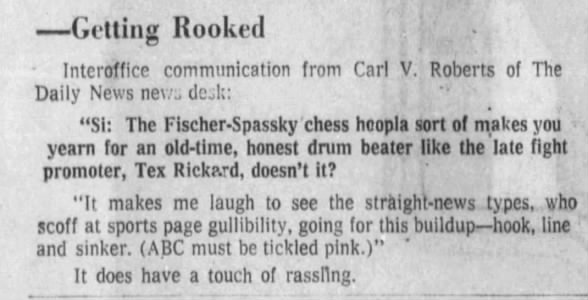 --Getting Rooked 06 Jul 1972, Thu Dayton Daily News (Dayton, Ohio) Newspapers.com
--Getting Rooked 06 Jul 1972, Thu Dayton Daily News (Dayton, Ohio) Newspapers.com
The Courier-News Bridgewater, New Jersey Thursday, July 06, 1972 - Page 30
Sports: Another Holdout by John Belis
Did you ever think you'd see the day when a chess player was a holdout? Bobby Fischer, the American chess wizard, proved that anything can happen when he failed to show up on time this week for his world championship match against titleholder Boris Spassky of Russia.
Reportedly, Fischer first balked because he objected to the site for the showdown—Reykjavik, Iceland.
A later report said that Fischer was holding out for more prize money. And when a British banker offered to add $150,000 to the post, Fischer caught the next flight to Iceland.
While many idealists expressed surprise and dismay over Fischer's behavior, I wondered how the hard corps chess enthusiasts regarded the situation. I decided to ask my friend Fred, a genuine crusader for the game (in chess circles he's known as the Checkmate Kid).
“Fred” I said, “were you and your friends disillusioned by the Bobby Fischer fiasco?”
He pounced on the question. “Certainly not! This is the best thing that ever happened to the sport, it shows that we're going big time. Didn't the baseball players strike this season and didn't the professional football players threaten to go on strike a few years ago?
“Look at the superstars in all the other sports. Willie Mays, Joe Namath, Wilt Chamberlain, Bobby Hull—they all get paid plenty. Why shouldn't our players get top money?”
What Is A Sport?
“But,” I protested, “are you sure that chess is a sport?”
For a moment, I thought there was a fire in his eyes. “Of course it is! It requires mental toughness, agility and long hours of training. Look how hard Fischer trained for his match against Spassky. You think that boxers work hard when they're preparing for a fight—that's nothing compared to what a chess player goes through.”
I was still doubtful. “I'm sure that all of what you say is true, Fred, but I still can't seem to get used to calling chess a sport. It doesn't demand any athletic ability, there isn't even any running involved.”
Now he was turning nasty. “All you sportswriters are the same, you're prejudiced. How much running is involved in golf—it's a glorified two-mile hike. And what about bowling—a bunch of fat guys drinking beer, sm*k*ng c*g*rs and rolling balls on the floor. That takes a lot of athletic ability.
“And where's your defense in golf or bowling? Chess has offered offense and defense and we observe the rules of sportsmanship.”
I could see that he was getting upset so I decided to pursue a different tact.
“Your arguments certainly are convincing,” I admitted, “but, assuming that it is a sport, you don't think it has a chance of attaining the popularity of the er— … more conventional sports, do you?”
“Ridiculous. Of course chess can have broad popular appear,” he maintained. “First of all, unlike football, baseball and basketball, chess is played world-wide. The game has endured for centuries and it has a richer tradition than any of the so-called leading sports.”
“You do have a point, Fred, but surely you'll admit that chess is strictly a participant sport. There can't be a whole lot of spectator interest.”
He jumped to his feet. “That's your fault, why don't we ever see chess stories on the sports pages? All we need is good public relations work and more exposure on television to make professional chess a real bonanza.
T.V. to the Rescue
“The T.V. dollar can do it. Look at the professional golf tour and the bowling circuit. Ten years ago, how many tournaments were there, and how much money was at stake? Television contracts did a world of good for other sports and they'll do the same thing for chess.”
This took me by surprise. “You mean that pretty soon we'll be seeing chess tournaments on Wide World of Sports? Somehow I can't imagine Howard Cosell reporting from boardside.”
“Not just tournaments,” said Fred, dreaming the Impossible Dream, “we may even start a chess league. All the big cities will have teams. Madison Square Garden, Boston Garden, Chicago Stadium, the Los Angeles Forum—they'll all be sold out for every match. Believe me, it can happen.
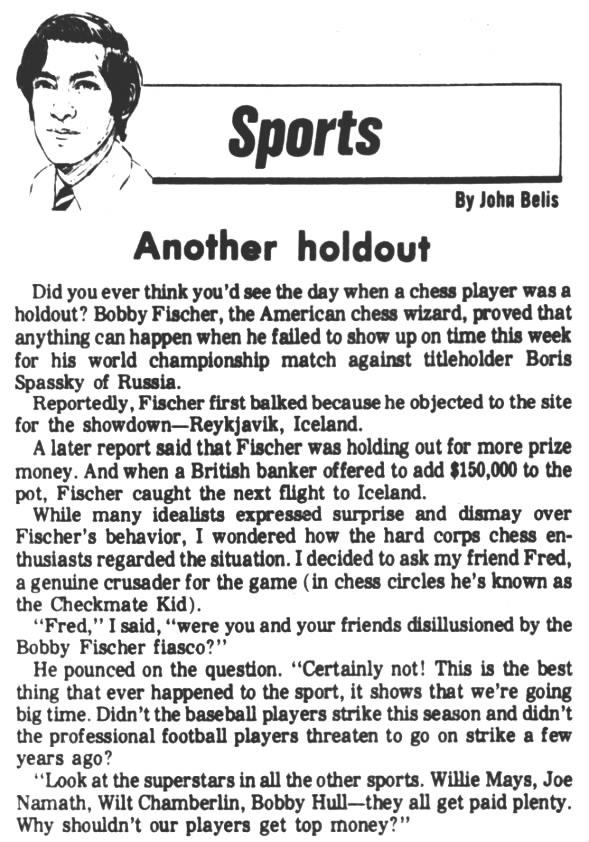 Another Holdout 06 Jul 1972, Thu The Courier-News (Bridgewater, New Jersey) Newspapers.com
Another Holdout 06 Jul 1972, Thu The Courier-News (Bridgewater, New Jersey) Newspapers.com
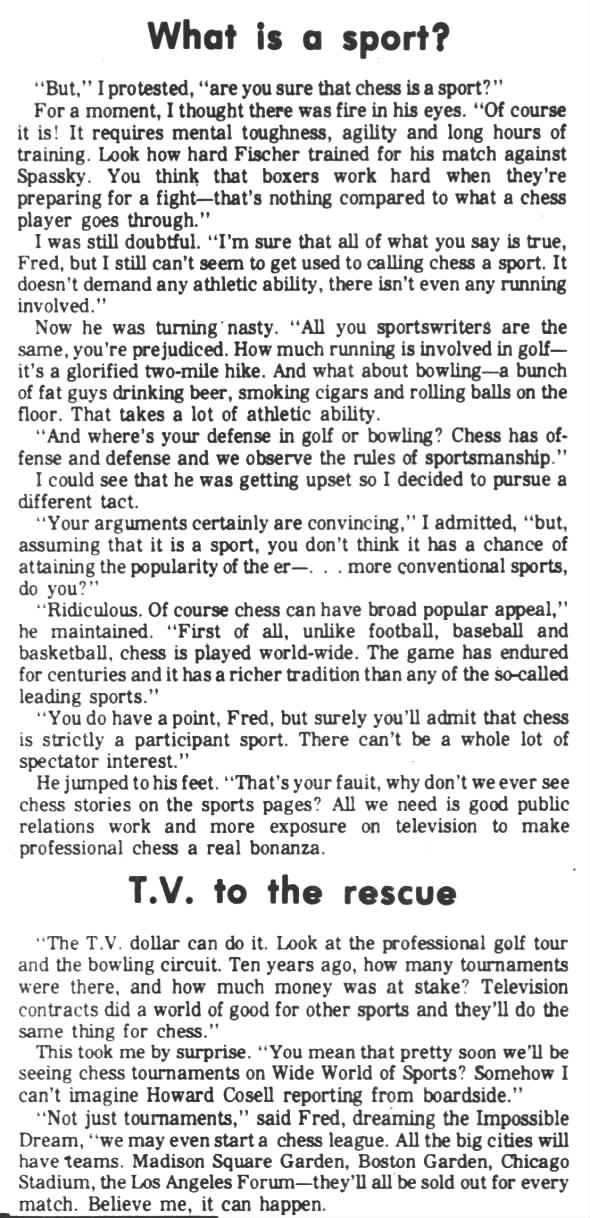 What Is a Sport? 06 Jul 1972, Thu The Courier-News (Bridgewater, New Jersey) Newspapers.com
What Is a Sport? 06 Jul 1972, Thu The Courier-News (Bridgewater, New Jersey) Newspapers.com
The Kansas City Star Kansas City, Missouri Thursday, July 06, 1972 - Page 3
Match Widens Interest in Chess by Andrew C. Miller
A month before Bobby Fischer and Boris Spassky arrived in Iceland for the international chess championships, chess devotees at The Chess House here were hashing over the match.
“Interest in the game as a whole is mushrooming,” said Jack Winters, the proprietor of the new chess store and playing room at 3909 Main.
“I think Spassky is kind of upset. I think they'll settle their differences and if they play, I think Fischer will win decisively.”
From the back of the room, Elliot Winslow, 20, the Missouri champion, interrupted. He was sitting among the eight chess boards at the new Chess House, alternately replaying games on a pocket chess board and plucking at a guitar.
“I don't think Fischer will hold together,” Winslow said. “In games before, he has gotten the advantage and then lost it.” Winslow said that when Fischer and Spassky played before, Spassky won three games and two games were drawn. Fischer's downfall came when he was faced with new strategies that had to be thought out “across the board.”
“Fischer did somehow find the right way, but then somehow he lost his way,” Winslow said.
Winters disagreed. “Fischer learned from his past mistakes and has improvements ready should he be forced into the same line (of chess play) again,” the shop owner said.
The Chess House opened in May, just in time to capitalize on the Fischer-Spassky matches. It is patterned after similar game rooms in New York City.
Winters offers chess lessons at $4 an hour and sells chess equipment and books. But most of all board space is rented at 35 cents an hour, and chess buffs gather there almost every evening to play — or talk — chess.
“In the last 10 years interest in tournaments has grown,” Winters said. He is a 33-year-old former student and tavern owner who turned his hobby into a business that is doing better than breaking even.
“Chess used to be an old man's game. Today already I'm an old man as far as chess is concerned. The bulk of tournament players are under 21, when 10 years ago most were over 35.”
Back in 1964 Winters played against Fischer in a simultaneous exhibition at Lawrence. Fischer played against 43 persons. He beat all but one player—he played to a draw with Winters.
“That got me really interested in the game,” Winters said. Since then Winters has reached an expert's rating in the numerical point system of the U.S. Chess Federation.
Winters plays often at The Chess House. He joins the other players as they hop around the room, matching skills against whoever enters the store. He won't play against Winslow, however. The two play such different games, and are so vocal about chess strategies, that a recent game ended in an argument.
On a recent afternoon Winters was playing a customer as Winslow was getting ready to leave. Guitar case in hand, Winslow glanced quickly at the chess board.
“He's got the advantage on you,” he told Winters.
“No, he doesn't,” Winters shot back. “Pawn to K4; pawn to K4. Knight to KB3;knight to QB3. Knight to B3; knight to B3. Then he went bishop to B4.”
The chess hieroglyphics finished, Winslow agreed, nodded gravely, and left.
Winters won.
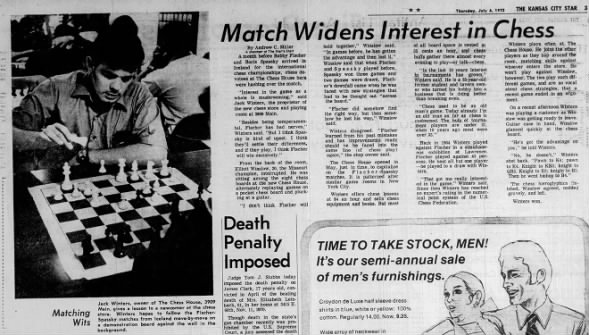 Match Widens Interest in Chess 06 Jul 1972, Thu The Kansas City Star (Kansas City, Missouri) Newspapers.com
Match Widens Interest in Chess 06 Jul 1972, Thu The Kansas City Star (Kansas City, Missouri) Newspapers.com
York Daily Record York, Pennsylvania Thursday, July 06, 1972 - Page 32
Fischer 'Sorry' But Match Still Uncertain
Reykjavik, Iceland (AP) — Bobby Fischer apologized.
He told Boris Spassky and the Soviet people Wednesday he was sorry if he insulted them by disrupting the world chess championship.
But the word from Moscow was tough, and Thursday's scheduled start of the matches remained uncertain. The Soviet Chess Federation demanded that the American challenger forfeit the first game of the 24-game match because he didn't show up for its scheduled start on Sunday.
Fischer's holdout, however, has brought the winnings—and even the losings—to the highest amount ever in any world championship chess match. The winner will get $231,250 and the loser $168,750. A few thousand dollars and prestige went to previous world champions.
Spassky, the defending champion from Russia, had complained that Fischer's conduct had “insulted me personally and the country I represent.”
The American, in a statement prepared by his lawyers and read by Max Euwe, the president of the International Chess Federation, said he respected Spassky as a man and admired him as a chess player.
The apology was the latest move in a complicated preliminary between the Americans and the Russians before they even got to the Italian marble chess board on the stage at Reykjavik's 2,500-seat Sports Palace.
Fischer's holdout for money postponed the scheduled start of the match Sunday. Spassky's countermove, a protest and a demand for an apology by Fischer, moved the starting date of the series to Thursday.
Officials said they weren't even certain about that.
They had to deal with the demand from the Soviet Chess Federation that Fischer be penalized for his arriving Tuesday, two days late. They wanted Euwe to declare Spassky the winner of the first game.
This would give Spassky a 1-0 advantage in the score at the outset of play. Chess experts said that in such a long match it was a disadvantage that Fischer could probably overcome. The match could last as long as two months.
From the frequent trips by Spassky and his second, Yefim Geller, to the gray three-story Soviet Embassy here, it was apparent the Soviet game was being played on directives from Moscow.
Fischer's apology said, “We are sorry the world championship was delayed. The problems causing the delays were not with world champion Spassky whom I respect as a man and admire as a player.
“If Grandmaster Spassky or the Soviet people were inconvenienced or discomfited, I am indeed unhappy, for I had not the slightest intention of this occurring.”
Though officials were clearly worried at one point that the Russians might pull out, Spassky was not behaving like a man who was on the verge of leaving.
Early in the afternoon he took his borrowed Ford to a car dealer because the right front wheel, he said “makes a funny noise.”
He waited around the showroom, kicking tires like a prospective customer, while mechanics repaired the wheel.
Afterward he drove back to his hotel.
The Russian would not talk about chess or the dispute delaying the match he says he wants to play.
Though Fischer went for a ride around town in a police car Tuesday night, he has spent most of his time holed up in a villa quarantined by a permanent police guard.
From his hideaway, Fischer had a U.S. Chess Federation official wake up one of the match organizers at 6 a.m. wanting to know: “Where's Bobby's car?”
On the long list of his special requirements was a Mercedes-Benz with automatic transmission. Officials say there are none in Iceland.
Then at midafternoon a policeman delivered a walkie-talkie set to Fischer's house presumably so he could confer with his two lawyers without having to use the telephone.
The Guardian London, Greater London, England Thursday, July 06, 1972 - Page 2
Apology Brings Truce in the Chess Cold War from Michael Lake
Reykjavik, July 05 — The world chess championship, fraught with fury and recrimination, looks like getting off to a start once again — but perhaps not until Sunday or even Tuesday — because the Soviet champion, Boris Spassky, is so distressed by the uproar over the behavior of the challenger, Bobby Fischer.
But the match seems to be on after a series of developments at a sizzling Soviet press conference here tonight. The Soviet grand master, Ewfim Geller, made three Soviet demands — that Fischer apologize for his behavior ([No Soviet apologies will be forthcoming for their own off-board, off-the-record illegal activities, behind the scenes]) that the president of the International Chess Federation, Professor Max Euwe, condemns Fischer; and that Mr. Euwe admits he violated the rules in postponing the match on Sunday before Fischer had dug up enough money to decide to come. ([It is difficult to come to a land, which has been notoriously racist, and anti-American due to widely circulated anti-American, pro-Soviet underground constituted by about 10% of the Icelandic population but for some reason, the Soviet Union representatives didn't feel it was worth mention, any more than Iceland provided ideal conditions to achieve censorship and media black out due to limited communications to the outside world.])
After 20 minutes of this Dr. Euwe negotiated with the Russians for the floor, condemned Fischer's behavior over several months as “inexcusable — there isn't anyone in this locality who would not condemn him” — ([But of course! That's precisely why the Anti_American Iceland was forced as the prime choice of the 1972 World Championship, and Euwe is fully aware of it, whether he admits to it or not. The black American service men at Keflavik might would disagree, but whoops! black Americans are not wanted on Icelandic soil by the Icelandic government, whom the Soviet had spent decades romancing, not at all unlike Stalin's well-documented romance with Adolf Hitler; “Molotov-Ribbentrop Pact”]) and freely admitted he had violated the rules to save the match.
The Russians also demanded the statement in writing so as to be confident that the rules would be obeyed in the future and Dr. Euwe, whose dignified approach during these trying days has been irreproachable, pulled out his pen and wrote his ([TOKEN]) admission, and commitment to the rules there and then on the back of a text of the Soviet demands. The press conference spontaneously applauded him.
The Russians, confronted with a barrage of questions as to whether they accepted this, had no option but to do so, although it has been clear that they have had to refer to Moscow for instructions all along the line.
They confirmed also that the Soviet Chess Federation in Moscow had demanded that Fischer forfeit last Sunday's opening game for which he failed to arrive; Dr. Euwe said he did not believe Spassky would accept such a point. Mr. Geller said the demands must stand, but that it was for Spassky to accept the point and he did not think he would.
Fischer meanwhile, still hidden from public view as if in quarantine, sent out a statement this morning expressing regret at the trouble. ([Which Moscow's egotism all too happy to create.])
Last night Mr. Geller indicated that he had a further note saying Fischer wished to express himself to the Russians in person tomorrow and this would then meet every demand.
Mr. Geller explained that such a situation would pave the way for resumed negotiations between the Russians, Americans and the ICF on the remaining unresolved conditions for the match such as furniture and press facilities.
It was at the end of a press conference which had correspondents and chess fans reeling — and sometimes shouting among themselves about the right to ask questions — at the rapid unfolding of events that Dr. Euwe put the brakes on.
He pointed out that if, as he thought quite fair, Spassky needed until Tuesday to recover enough to start the match, this would prolong the 24-game test so that it clashed with the chess Olympics in Skopje in September. His own feeling was that the match might be split, half the games to be played here now and half here later in the autumn. He said that Spassky was “damaged” and would be at a disadvantage if the match began tomorrow.
It was not clear, however, what Spassky thought, and one source close to the Russians said he thought that a further long delay until Tuesday would be even worse for Spassky.
There is no doubt what the chess world thinks of Fischer in the emotionally charged atmosphere among the attendant grandmasters and ([infamously racist, and Anti-American which should be pointed out, worldwide, that Soviet publications regularly canvass Icelandic]) fans here, among the dozens of journalists, and among the Icelanders. Fischer and his companion are getting the bird in a big way ([and would have, even had there been no delay. Fischer deserved 5 times the payoff, for being forced to play in a hostile, Anti-American haven, with its Anti-American propaganda going back, decades when Fischer was yet a child in sneakers, under the tutelage of chess master Max Pavey!]) The claim by Fischer today that he had no intention of causing trouble was regarded with particular derision.
In his condemnation tonight, Dr. Euwe said: “He's living in another world. That does not mean he is forbidden to do everything he likes, but these abnormalities are unacceptable.” ([None of the Soviet aberrations of course, will be condemned as they plot and seek to derail the match with their well-documented heavy-handed coercion and manipulation.])
The whole event escalated this morning from a sport into a revival of the cold war. Spassky launched a furious and scathing attack on Fischer. He said: “Fischer has violated the rule of behavior by refusing to attend the solemn opening ceremony.”
The Boston Globe Boston, Massachusetts Thursday, July 06, 1972 - Page 26
Chess On Tube? It Must Be Real by Leigh Montville
The headline on the wall of the Boston Chess Shop explained the situation better than anything.
SPASSKY'S MOVE—
HE WALKS OUT
The words were black and bold and from an unexpected source. The New York Daily News had discovered chess.
The New York Daily News? Yes, by God, the New York Daily News. The crookedness of Fun City had been pushed inside with the Treasury balance. Chess had commandeered the front page and the big headlines.
“How about that?” chess shop proprietor Bill Lukowiak said yesterday. “For an intellectual sport like chess to cover the front page of the New York Daily News — to cover the whole front page—is about as wild as you could imagine.
“And how about all the television. Here's chess vying with the Democratic National Convention for time. Chess finally is real. It's on the screen.
“In this day, you're not real until you're on television and now, all of a sudden, chess finally is real.”
Indeed, it is. If reality is big headlines and television, chess has become as real as the stain on your tie, the hangnail on your left index finger.
The media world hangs on every move of this world championship meeting between Bobby Fischer and the villainous Soviet in the wilds of Iceland. Is it on? Is it off? Frank Sinatra never courted Mia Farrow, Jackie never married Ari, Albert Scopes never taught that we all came from monkeys with any less fanfare.
Fischer has pumped the event with public relations wildness that must make Muhammad Ali smile. Spassky has been beautiful, far better than your basic George Chuvalo heavy. He has added his own degree of somber petulance to the affair.
Is it on? Is it off? The chess world has invaded the outside world. Finally.
“That's why we're here,” Bill Lukowiak explained pointing around his shop at 335 Newbury St., “We moved here in April from a place down the street.
“Here we have more tables, more room. We're ready. We expected this. That's why we expanded.”
The room contained 40 tables, 40 timers, the chance for 80 players to be involved at once at 50 cents for the first hour, 35 cents an hour afterwards. A boutique shop sold chess sets (from $3 to $400) and a variety of books that included dusty tomes that could give the addict every move of every major game Spassky and Fischer have played.
For free, the addict could read all the big headlines and stories pasted on the wall across from the two men's rooms (“we don't get many women here”), and could get a lot of talk about the big match.
“That's all anyone seems to be talking about around here these days,” Lukowiak said as four different matches quietly clicked along. “Just about everyone is rooting for Fischer.
“He's the new player we've been waiting for. We've been waiting for this match since 1957. What's that, 15 years? We've been waiting for Bobby Fischer to play the Russians for 15 years.”
Lukowiak, 29 years old and rated as an expert player
William Lukowiak
Number of games in database: 9
Years covered: 1959 to 1990
thinks Fischer has been misinterpreted. He said the holdout for more money was a solid move. He said the fear of the Russians bugging rooms and poisoning food was far from paranoia. He said the Russians would do it.
Before Navalny, a long history of Russian poisonings
“This title means a lot to them, more than the people of this country seem to understand,” Lukowiak said. “This is the classic match between American individualism and the Soviet system, and the Russians don't want to lose.
“Everything Fischer had done has been smart. Although…”
Although what?
“Although if he hadn't decided to show up, we probably would have taken up a collection around here to put a contract on him…
“We've been waiting for this match for a very long time.”
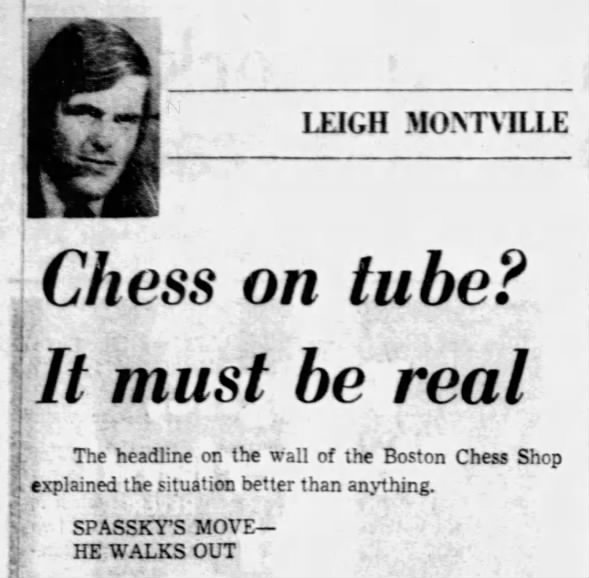 Chess On Tube? It Must Be Real 06 Jul 1972, Thu The Boston Globe (Boston, Massachusetts) Newspapers.com
Chess On Tube? It Must Be Real 06 Jul 1972, Thu The Boston Globe (Boston, Massachusetts) Newspapers.com
Albany Democrat-Herald Albany, Oregon Thursday, July 06, 1972 - Page 4
Even Chess Is Bloody
Eugene's U.S. Olympic Track and Field Trials aren't the only big athletic events this week. Just look at what's happening in Iceland. Yes, the jousting and warm-ups there apparently give almost as good as show as the Olympic trials.
The chess match won't begin until Sunday at the earliest. But it seems American chess champ Bobby Fischer has been prepping like an Olympian for his series with world titleholder Boris Spassky of Russia.
Fischer drank nothing stronger on his flight from New York City than a glass of milk. Upon his arrival in Iceland, he promptly went to bed.
Spassky canceled the first game. But was Fischer awakened to hear this surprising news? No. A chess official said, “I didn't want to upset Bobby's metabolism by waking him up.”
The official probably knew of Fischer's daily routine of calisthenics, swimming, tennis and bowling. And he probably was aware of a study Temple University made a few years ago.
Researchers hooked up 12 chess players to fancy medical gear. They measured pulse rates and a lot of other things supposed to show how much energy the chess nuts expended. They found a chess match to be as strenuous as boxing or football.
Of course Fischer's big interest in the Iceland series is money. He wouldn't play until he was guaranteed more than a generous cut. Spassky appears to be steering the match into a diplomatic contest between the Soviet Union and the United States.
But this pregame tension can't go on for long. Any Olympic starter knows you can't keep runners at the starting line indefinitely without someone jumping the gun. It should be no surprise to see Fischer and Spassky squeeze real blood from their pieces once their duel gets under way.
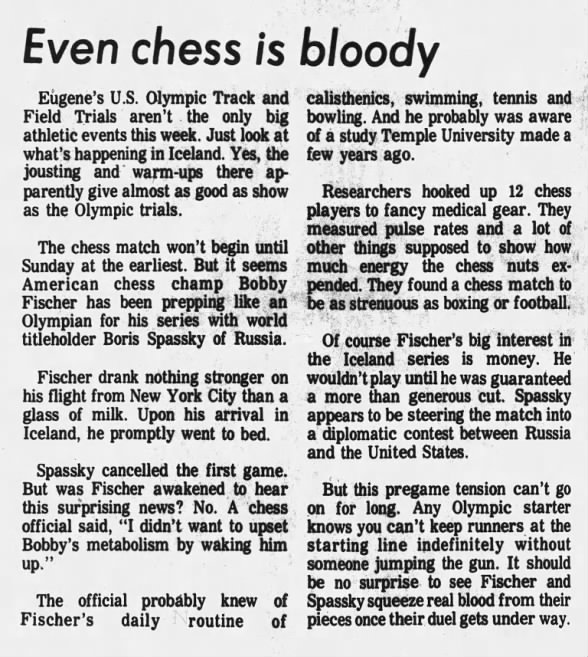 Even Chess is Bloody 06 Jul 1972, Thu Albany Democrat-Herald (Albany, Oregon) Newspapers.com
Even Chess is Bloody 06 Jul 1972, Thu Albany Democrat-Herald (Albany, Oregon) Newspapers.com
The Journal Herald Dayton, Ohio Thursday, July 06, 1972 - Page 4
Chess Anyone? . . . Fischer and Spassky Display Gamesmanship
Things almost never go smoothly when East and West try to get together over a table. This time Bobby Fischer of the United States and Boris Spassky of the Soviet Union are the negotiators, and chess is the name of the game. At stake is someone's version of the world championship and total prize money of $250,000.
Fortunately, both parties seem to concede that the game should be played on a square table, so we don't have any nonsense about the shape of the table.
Until recently, however, there has been a suspicion in some quarters that chess is a game of squares. But the two current adversaries for the world championship have appropriated some of the devices of different kinds of chess players — the labor negotiator and the diplomat.
Fischer wanted more money, and struck to get it. Then he got it, and set out for the site of the match, Reykjavik, Iceland, which may become as renowned as Paris and Geneva before all the negotiations are over. The International Chess Foundation has already given Fischer a two-day reprieve when he arrived. So then Spassky went off in a sulk because he felt Fischer should be disciplined.
Such tactics are not new in the game of diplomatic chess where lives and nations are at stake. It's a relief that in this world championship game of real chess there are only dollars and prestige at stake. Come to think of it, dollars and prestige may be a hangup in both brands of chess.
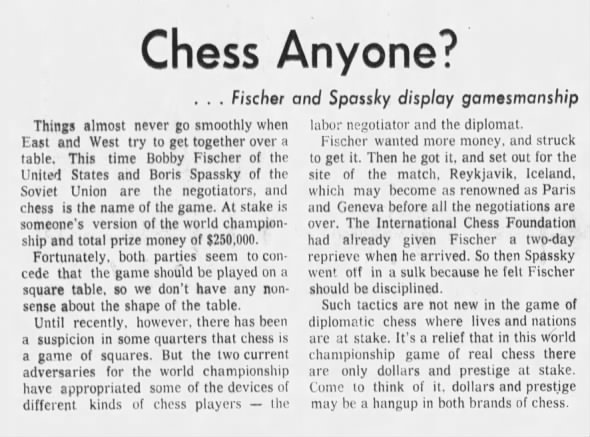 Chess Anyone? 06 Jul 1972, Thu The Journal Herald (Dayton, Ohio) Newspapers.com
Chess Anyone? 06 Jul 1972, Thu The Journal Herald (Dayton, Ohio) Newspapers.com
Pacific Daily News Agana Heights, Guam Thursday, July 06, 1972 - Page 19
Russians Ask Fischer To Apologize
Reykjavik, Iceland (UPI)—In Iceland yesterday U.S. chess champ Bobby Fischer and Soviet world champion Boris Spassky drew lots to see who gets first move in their world chess championship match. Fischer finally agreed to come to Reykjavik, Iceland, for the match, but only after a British banker offered to double the prize money.
The differences between Spassky and Fischer were still unsolved last night after a two and a half hour negotiation session in which Fischer's lawyer Paul Marshall and Father William Lombardy, his official second, met two of Spassky's advisors.
Marshall told a news conference that the Russians had presented two statements; one by Spassky and one by the Soviet Chess Federation.
He said, “the matter is so delicate that I don't want to reveal the contents.”
“The discussions were frank and we will hopefully be able to resume them tomorrow,” Marshall said in a brief statement. “We are hopeful we will solve the problems tomorrow so the match can be played.”
He refused to answer questions and hurriedly left the conference room, followed by Lombardy, a Catholic priest and a chess grand master.
Spassky's note asked Fischer for an apology, according to informed chess sources, but Cramer said “I cannot see Fischer apologizing.”
The Daily Tribune Wisconsin Rapids, Wisconsin Thursday, July 06, 1972 - Page 20
Big Chess Match on for Tuesday
Reykjavik, Iceland (AP) — Bobby Fischer lost the draw Thursday night, giving Boris Spassky the first move, and the world championship chess match will finally start next Tuesday.
Unless the American challenger or the Soviet champion pleads illness and gets another postponement.
The confusion of the past week was summarized by the old woman selling c*g*r*tt*s who asked in the beginning: “Fischer come?”
Near the end it was: “Spassky go?”
“I'm very pessimistic,” Dr. Max Euwe said at 10 a.m. At noon: “It's a very delicate situation.” At 7 p.m., the president of the International Chess Federation sighed: “There's hope.”
That was Tuesday. It could have been any day in the garbled prelude to what chess lovers say is the match of the century — Spassky of the U.S.S.R. vs. Fischer of the U.S.A.
Spassky arrived early to wait for Bobby. Saying “I came to play,” he philosophically accepted the first postponement when Fischer didn't show.
Later he demanded an apology or he wouldn't play.
At one news conference, one of Fischer's lawyers said he'd come to say he had nothing to say.
Yefim Geller, Spassky's second, fielded questions with: “Kak Gavarit po Angliski,” or as you say in English, “No comment.”
Then there's the “Eavesdropper,” a man approaching middle age with a shock of graying hair combed in careful disarray onto his forehead.
He takes voluminous notes, for a magazine piece, he says. On scraps of paper he records conversations he's overheard. He carries the scraps in a red plastic shopping bag as he moves soundlessly about the hotel lobbies.
One final quote, from Gudmundur Thorarinsson, president of the Icelandic Chess Federation, who was under pressure from Fischer to give up a share of the gate receipts:
“I have worked for more than a year to get this match to Iceland. I would do many things. But I will not bite into a sour apple.”
Thanks to a rich British chess fan who doubled the stakes, he didn't have to.
The Leaf-Chronicle Clarksville, Tennessee Thursday, July 06, 1972 - Page 8
Around the Circuit with Gene Washer, Sports Editor
Bobby Fischer has made a strategic move similar to castling and the world chess championship hasn't even begun yet.
In addition to make a full and penitent apology to Boris Spassky today, Fischer's entire moves for the past month have brought more attention to the world chess championship than Red China did to ping pong.
Heretofore a game played by stiff-lips in an air of dignity akin to the atmosphere of a funeral parlor, Fischer has run up a flag with dollar signs on it.
In his apology, he repented for his “disrespectful behavior” saying “I simply became carried away by my petty dispute over money with the Icelandic chess organizers.”
If the drawing goes without incident tonight, Fischer and Spassky will it at the chess table Sunday night for their first game in Reykjavik, Iceland.
Chess is a grand old game dating back to the early days of India when, as the legend goes, a couple of old tiring Maharajahs thought of the game as a way to settle their differences. It was better than carving each other up with knives.
The name was derived from the Persian world “shah” and it is a descendant of the game Chaturanga, which is referred to during the Middle Persian Karnamak (c. 590-628).
The game went to Britain in about 1255. The Federation Internationale des Echecs was established in 1924.
In Russia alone there is reputed to be five million active players—which is why they are so important on the international chess scene.
World champions weren't recognized until 1843 but some of the Babe Ruths and Mickey Mantles of the game include Francois Andre Danican, alias Philidor, of France, who claimed the world championship from 1747 to 1795.
William Steinitz held the title but was beaten out by Dr. Emanuel Lasker of Germany,with a record of 26 to 8, with 12 draws.
Paul Charles Morphy of New Orleans was the youngest world champion, winning the title in 1958 at age 21.
Yes, women, there are a few gals who won the Women's World Chess Champion title. Russia's Elisaveta Bykova won in 1953, 1958 and 1960.
The team championship, of course, has been won by Russia 11 times since 1952.
And here is one last little interesting fact about the game.
The most protracted chess game on record was one drawn on the 191st move between H. Pilnik (Argentina) and Moshe Czerniak (Israel) at Mar del Plata, Argentina in April 1950.
They played 20 hours. There was a game of 21:30, but drawn on the 171st move (averaged 7½ minutes per move). And there was a 221 move game in 1969, but it took only 4:25 to play.
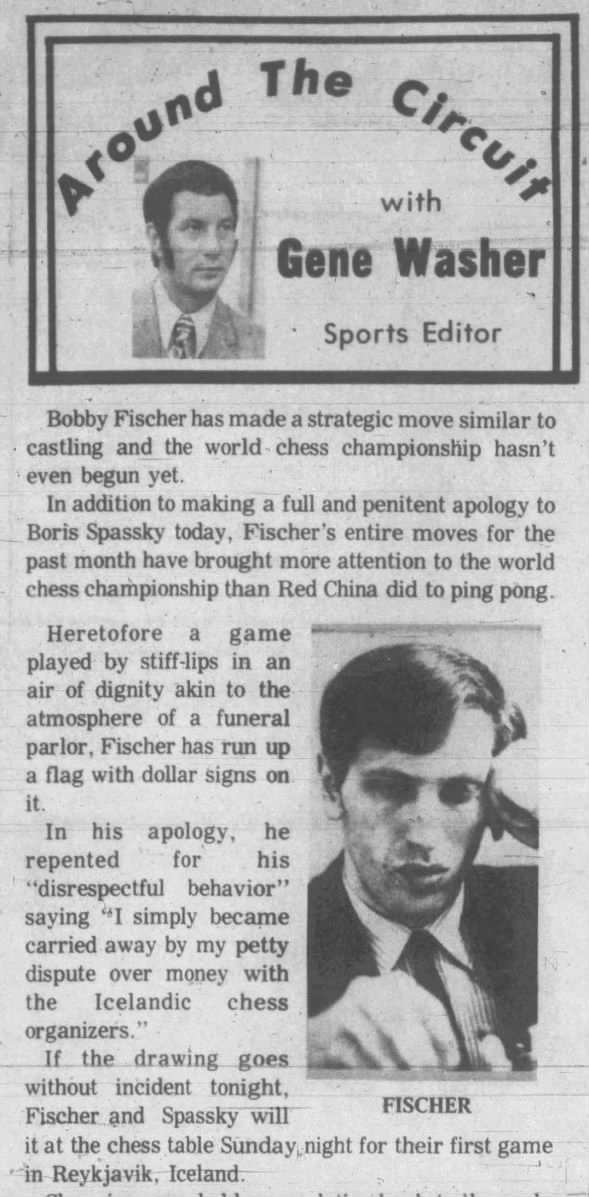 Around the Circuit with Gene Washer, Sports Editor 06 Jul 1972, Thu The Leaf-Chronicle (Clarksville, Tennessee) Newspapers.com
Around the Circuit with Gene Washer, Sports Editor 06 Jul 1972, Thu The Leaf-Chronicle (Clarksville, Tennessee) Newspapers.com
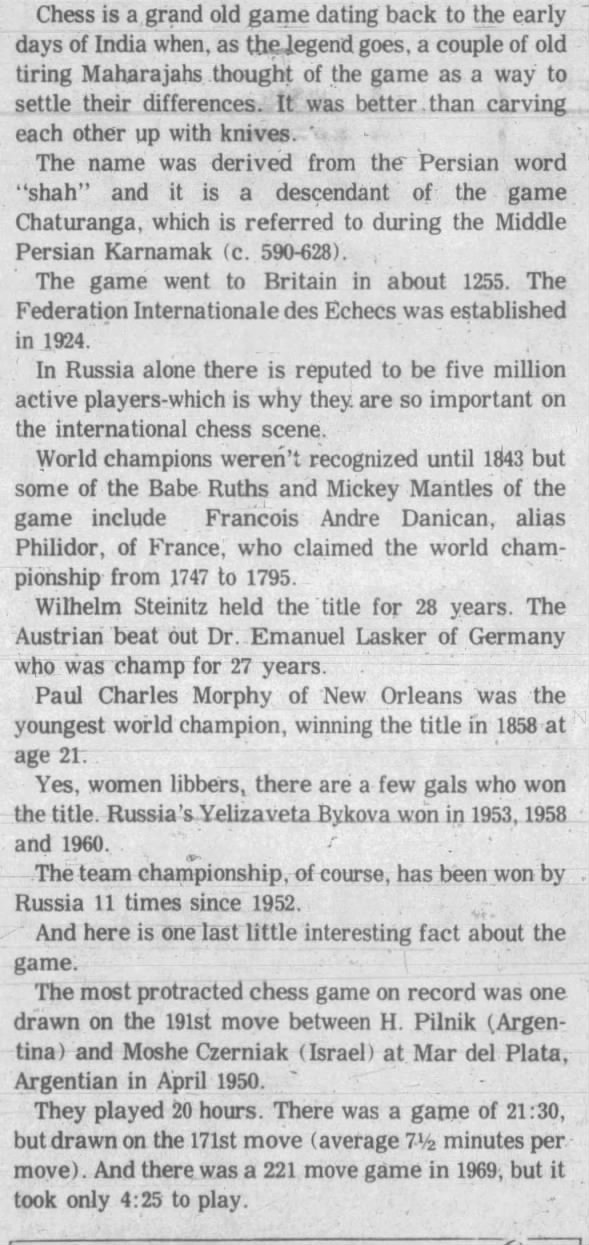 Around the Circuit with Gene Washer, Sports Editor 06 Jul 1972, Thu The Leaf-Chronicle (Clarksville, Tennessee) Newspapers.com
Around the Circuit with Gene Washer, Sports Editor 06 Jul 1972, Thu The Leaf-Chronicle (Clarksville, Tennessee) Newspapers.com
Star Tribune Minneapolis, Minnesota Thursday, July 06, 1972 - Page 8
The Pre-Match Play-by-Play
Let's see whether we're up to date on the Bobby Fischer-Boris Spassky thing. Fischer went to the International Chess Federation's Q4, then sat there, refusing to move farther. While Spassky paced angrily back and forth from his QB3 to his QB4, James Slater, the British financier, moved $130,000 to Fischer's KR1, where it was locked in the keep. Then Spassky castled while Fischer slept. During all the foregoing, the president of the International Chess Federation made wry comments.
Childish? Maybe—but when was the last time you saw so much publicity given to a chess match? And when has the prize money for one ever gone so high? It's more likely that Fischer has just discovered a way to move chess into the realm of big-time (and big-money) pro sports. He's going to turn up on bubble-gum cards yet.
Meanwhile, at least the wire services covering the Fischer-Spassky maneuverings have been handed a ready-made metaphor. Never before has it been so appropriate to write that something has been “stalemated.”
And just to push that sort of thing a bit further, we might assume that the match will go on when Fischer sees the check, mate.
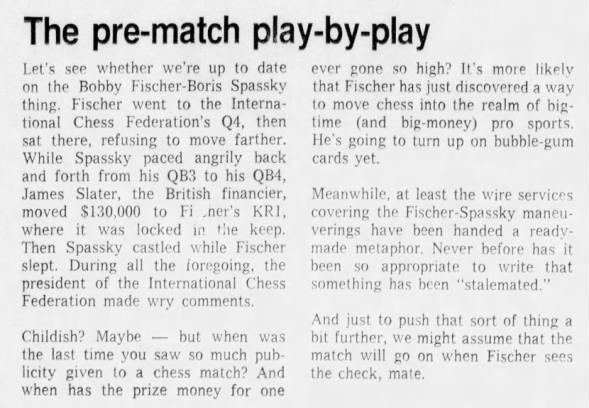 The Pre-Match Play-by-Play 06 Jul 1972, Thu Star Tribune (Minneapolis, Minnesota) Newspapers.com
The Pre-Match Play-by-Play 06 Jul 1972, Thu Star Tribune (Minneapolis, Minnesota) Newspapers.com
The Daily Journal Fergus Falls, Minnesota Thursday, July 06, 1972 - Page 4
The Bobby and Boris Show
Finally, the long-awaited confrontation had been set. The chess world was holding its breath. Bobby Fischer, America's prodigy and grandmaster, had played his way into a match with Boris Spassky, the Russian who is the present world titleholder.
Could the brilliant American handle the experienced Spassky? There were overtones in the competitive lineup of country against country, almost like the days of the space race when the U.S. and the Soviet Union each toiled to be Number One.
The place was Reykjavik, Iceland. the time Sunday, July 2. But hold everything. Bobby Fischer, our pride and joy, failed to show up at the appointed time and place. he was not satisfied with the financial arrangements of the match and was holding out for more money. A British financier agreed to sweeten an already record pot with an additional $130,000 and Bobby said he'd play.
He arrived in Iceland a few hours before a deadline for forfeiture set by the International Chess Federation. He went straight to bed to rest up for the first game, but he woke up to find it was all off again. Mr. Spassky, in protest to Bobby Fischer's holdout tactics, had demanded a two-day postponement. It appears that they may start play today.
Any way we look at it, it appears as though the match actually began when Bobby failed to show up in Iceland last Sunday. The “holdout” ploy was an affront to the reigning champion and a calculated piece of psychological warfare. The strategy to “psych” an opponent is common in most sports—why not chess? Boris, of course, was compelled to counter-attack with his own postponement demands.
And Mr. Fischer's cries for more money are familiar to all sports fans these days. The so-called “jock” world of professional sports is well-known for its preoccupation with dollars — should chess be any different? We don't know. Obviously Bobby Fischer wants more than prestige and adulation for his cerebral workout, just as Joe Frazier wants more from a boxing match than a fat lip.
Whose move is it now?
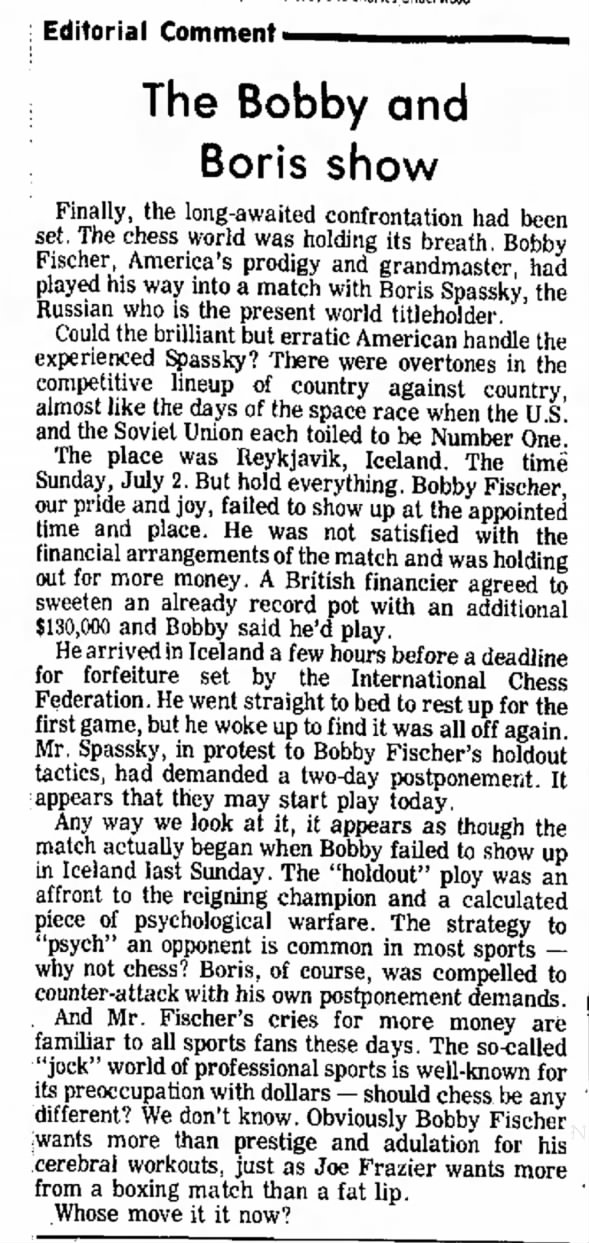 The Bobby and Boris Show 06 Jul 1972, Thu The Daily Journal (Fergus Falls, Minnesota) Newspapers.com
The Bobby and Boris Show 06 Jul 1972, Thu The Daily Journal (Fergus Falls, Minnesota) Newspapers.com
The News-Palladium Benton Harbor, Michigan Thursday, July 06, 1972 - Page 2
Anyone For Chess?
The time line between a sport turning from an amateur into a professional status or a combination of both is the marketplace rule of thumb of how many people will pay to watch the activity or bet on its outcome.
In the U.S. the oldest professional sports probably are horse racing.
Professional boxing and baseball came on the scene a century ago. Play for pay in football, basketball, and golf emerged following World War I. Hockey moved down from its Canadian homeland at the same time. Wrestling or the Broadway version of it started in the late '20s. Professional tennis started up in this period but only in recent years has it approached the financial stability necessary to stabilize it as a going concern. Auto racing has pre-World War I roots. Roller skating derbies are a TV byproduct.
The foregoing is not an exhaustive list, but is representative of a professional sport's basic requirement of sufficient spectator money being available so that the players and promoters foresee the opportunity to make at least pork chop and money laundry from their endeavor.
Though chess scarcely fits the basic requirement in any sport of a physical capability well above the sand lot level, the play for pay conversion has entered into this extraordinary mental game. If a mathematician can make more money programming computers than in teaching, there's no reason against a finely honed mind testing his marketability with a board and figurines. Any number of sharp people have earned highly respectable incomes demonstrating that the fall of the cards, has nothing to do with a good bridge game.
In the past few days Bobby Fischer, America's foremost grand master in chess, has demonstrated that holdout football stars and striking baseball players have nothing on him.
Following weeks, months even, of negotiations akin to Henry Kissinger's cloak and dagger jaunts to Red China, the International Chess Association arranged a world championship match between Bobby and Boris Spassky, the Russian who's held the titlist crown since 1969.
The plan first called for the two geniuses to play 12 games at Reykjavik, Iceland's capital and another dozen in Belgrade, Yugoslavia's capital.
The Association dropped this schedule because Fischer objected to the gate guaranteed by the Belgrade people. It set 24 games entirely at Reykjavik where the prize money was raised to $125,000, winner taking 60 per cent.
Sunday was to have been the starting date.
Spassky moved to Reykjavik two weeks preceding the opener. Fischer delayed his announced departure until this past Thursday.
Instead the American champ went into hiding and did not leave until Sunday, and not until the sweepstakes had been doubled. James Slater, a London millionaire put up the extra money. He told reporters the price was worth it to a chess buff.
The pot sweetened to his liking, Fischer said he was ready to sit down to the table on the Fourth.
This failed to suit Spassky who declared Bobby had insulted him and all of Russia by the delaying tactics.
Though the Russian did not refer publicly to Uncle Sam's birthday, it may well be that the Kremlin ordered him to skip an Independence Day starter.
The two intellectuals are supposed to begin dueling today.
Nick the Greek has wisely steered clear from handicapping the Olympic version of mental gymnastics, but regardless of the outcome Bobby has already won out on the dramatics.
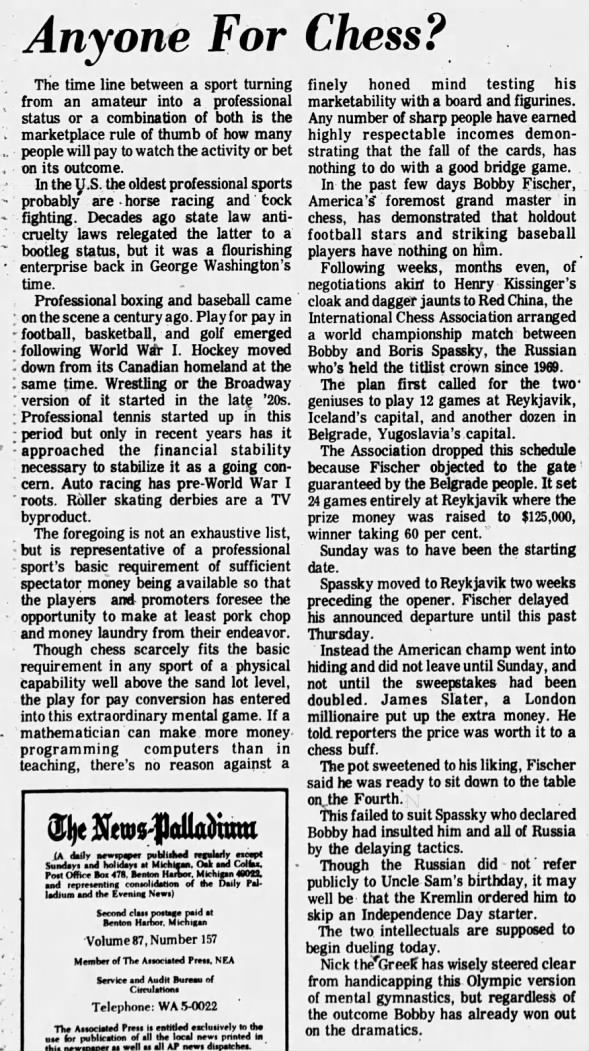 Anyone For Chess? 06 Jul 1972, Thu The News-Palladium (Benton Harbor, Michigan) Newspapers.com
Anyone For Chess? 06 Jul 1972, Thu The News-Palladium (Benton Harbor, Michigan) Newspapers.com
Times Colonist Victoria, British Columbia, Canada Thursday, July 06, 1972 - Page 14
Chess Match Financier Led Chequered Career
London (CP) — Jim Slater, the millionaire investment banker whose $125,000 contribution saved the world chess championship from an early collapse, is a master of the game himself.
Slater, 43, is already a legendary figure in British financial circles after an astonishing rise during the 60s from an obscure position in industry to chairman of Slater Walker Securities—an international investment banking firm.
He established himself as an outstanding chess player at age 11 when he captured the British boys' championship and drew with the adult champion, Sir George Thomas.
“But I gave up chess after that; it was too all-consuming and I wanted to become an accountant, and it wasn't until the last five years or so that I started playing again,” Slater said in an interview.
Likes Blind Chess
Apart from chess, most of Slater's leisure hours are spent with his wife and three children. “But my wife likes chess, too, so we have no trouble agreeing how to spend our free time.”
Now he often played blindfolded because “it intensifies the mental concentration which I'm forced to use and it adds a whole new spirit to the game.”
A well-worn chess board now stands in his office beside St. Paul's Cathedral and young, ambitious directors of his rapidly-expanding firm are frequently invited to match their skill against Slater. Would a director who won too often be out of favor, he was asked.
“Hell, no. I'd promote him. It doesn't happen that often.”
Tall, sharp-featured and charming, Slater says he decided to contribute $125,000 to double the prize money in the world chess championships in Reykjavik, Iceland because the &lduqo;game's the thing and if money is the only way to have it played, then I have it to give.”
His donation took the form of a direct challenge to Bobby Fischer of the United States to show up in Iceland for his scheduled game with Russia's Boris Spassky, defending world champion.
Slater was already well known as co-sponsor of the annual Hastings International chess competition.
Friends say Slater was neither particularly bright nor ambitious in school. In his early years he was obsessed with chess.
Got Drive In Army
He was called up in the army after the Second World War and his experience in the ranks with many men who saw no prospects of success in their lives gave him the urge to push ahead, says Slater.
He formed his present company early in the 1960s in partnership with Peter Walker, now housing minister in the Conservative government and out of the business.
By the end of the decade, Slater Walker was Britain's 75th largest company with market capital of about $210 million.
“My ambition is to build it into one of the biggest industrial investment companies in the world,” says Slater who, despite his responsibilities, works only four 7½-hour days a week. He takes eight weeks holidays a year.
Had he ever regretted going into business instead of devoting his full time to chess?
“Well, I love chess. But, you see, business is an even more challenging game.”
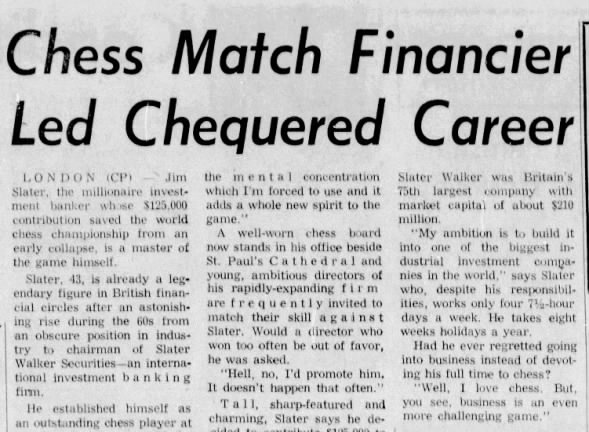
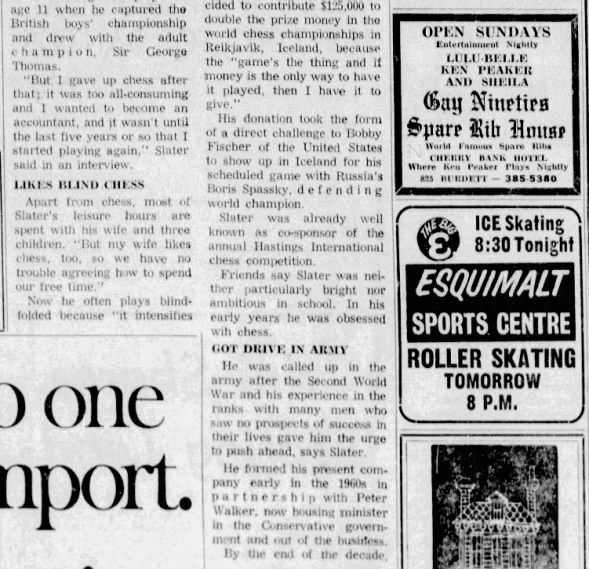 Chess Match Financier Led Chequered Career 06 Jul 1972, Thu Times Colonist (Victoria, British Columbia, Canada) Newspapers.com
Chess Match Financier Led Chequered Career 06 Jul 1972, Thu Times Colonist (Victoria, British Columbia, Canada) Newspapers.com
The Decatur Herald Decatur, Illinois Thursday, July 06, 1972 - Page 6
Bobby, Boris and Leo
THE MOVES of the players themselves are getting as complicated as any chess strategy.
First the American, Bobby Fischer, balked at getting to the world chess championship match in Iceland.
Then the Russian, Boris Spassky, decided to protest Fischer's delay of the match by delaying it further.
One suspects that the match already has started with Boris and Bobby each doing his best to “psyche” the other.
It's as if they think they can checkmate the other guy before even a pawn is moved on a board.
Sounds as if it's the opening of an American baseball season.
Who says chess is a game for gentlemen?
Leo Durocher would feel right at home in company of Bobby and Boris.
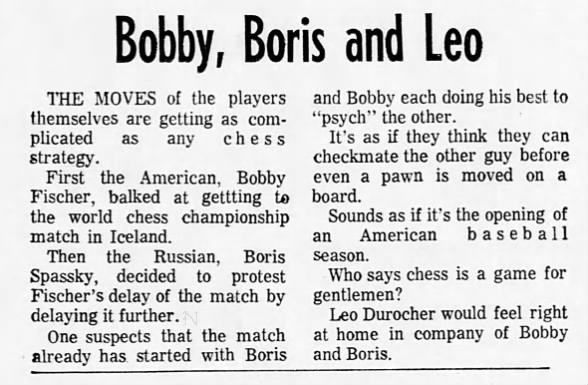 Bobby, Boris and Leo 06 Jul 1972, Thu Herald and Review (Decatur, Illinois) Newspapers.com
Bobby, Boris and Leo 06 Jul 1972, Thu Herald and Review (Decatur, Illinois) Newspapers.com
The Palm Beach Post West Palm Beach, Florida Thursday, July 06, 1972 - Page 14
B & B On The Rocks
Considering that cold war going on between Bobby and Boris, it seems appropriate that they will square off — or might square off — or might not square off — in Iceland.
American Bobby Fischer, who obviously doesn't want to get rooked either by his chess opponent or by the purse that goes along with the 24-game match, riled up Russian Boris Spassky by showing up late and not appearing for the draw to determine who would play white in the first game.
So Boris gets all huffy. He says Bobby broke the rules, insulted him and the Soviet Chess Federation, and that he must be punished. This crisis comes on the heels of other match postponement threats.
To add frustration to this celebrated mess comes the Soviet Chess Federation demanding, despite Bobby's apology to Boris, that the American forfeit the first game because of his bad conduct. That hardly seems fair. In fact, it would be unfair if an order went out only to lift a lance on one of his bishops or pilfer one of his pawns. After all, the idea of this match is to determine the better chess player — not the better diplomat.
At this juncture, it must be hoped that this crisis-to-crisis affair in Iceland does not continue, that Boris and Bobby quit playing games and start playing games, that their ego antics do not checkmate U.S.-Soviet relations or, Heaven forbid, lead to World War III.
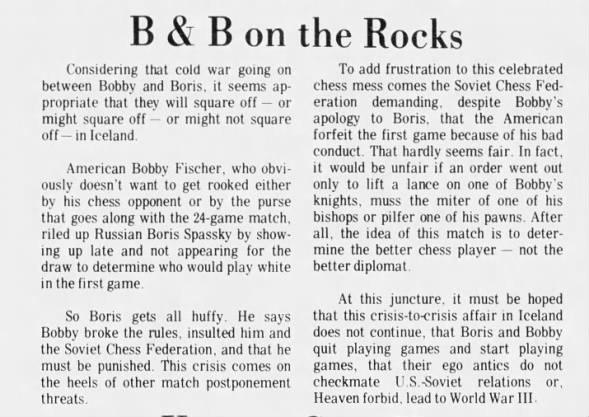 B&B On The Rocks 06 Jul 1972, Thu The Palm Beach Post (West Palm Beach, Florida) Newspapers.com
B&B On The Rocks 06 Jul 1972, Thu The Palm Beach Post (West Palm Beach, Florida) Newspapers.com
Philadelphia Daily News Philadelphia, Pennsylvania Thursday, July 06, 1972 - Page 31
Checks and Mates
Another note from the world of culture (see above editorial): While the world awaits the start of the will they, won't they Bobby Fischer-Boris Spassky world championship chess match let's take a look at the stakes.
There's the title, of course. And then there's that loot. With the pot increased at Fischer's insistence, the winner will get $156,250 and the loser $93,750. Also each player will get another $75,000 from TV and film rights.
Now we know that Fischer the American has an obvious rich streak of that “Wall Street Materialism” the Soviets are always harping about. But we wonder what will Spassky, the devoted Communist, do with all those rubles?
([Correction: Spassky reportedly was not a “devoted” member of the Soviet Bolshevik/USSR party. Fischer, gave almost all the prize winnings away to his church.])
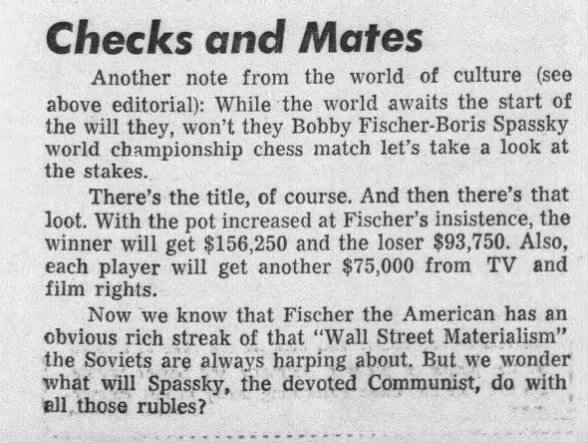 Checks and Mates 06 Jul 1972, Thu Philadelphia Daily News (Philadelphia, Pennsylvania) Newspapers.com
Checks and Mates 06 Jul 1972, Thu Philadelphia Daily News (Philadelphia, Pennsylvania) Newspapers.com
The Bangor Daily News Bangor, Maine Thursday, July 06, 1972 - Page 33
Speaking of Sports by Owen Osborne
Not since the ping pong match with the Chinese has an international match caused such a stir.
The Olympics have taken a back seat. The Wimbledon finds people asking, “Who's Wimbledon?”
The world trembles in anticipation.
A Yank and a Russian have a chess match.
We're not quite sure hour it has affected your life but for some, they've even lost interest in soap operas. For women this is serious because they could miss chapters of As The Stomach Turns.
This chess match is going to be a fight to the finish, a death match. Not even Chief Strongbow and Turo Tanaka in their tag tussle with the Mad Russians can compare with it.
Competitors tell how they must prepare for such a match, the physical exercise needed to get in condition, the mental mood needed to match wits. This is the greatest thing to hit Iceland since the Ice Age.
Fischer and Spassky will go down in history with Dempsey and Tunney, Tinker, Evers to Chance, Rockne and his Four Horsemen. Generations from now kids will listen in awe as details of this match are told.
Perhaps best of all is the fact it will be televised. The entire world can watch the breath-taking moves, the daring and the cunning.
This should be a coup for a sponsor. This of the minutes it will leave between moves, the opportunities to go to the refrigerator if you're having more than one.
While the match is underway a sponsor won't get rook-ed.
Best of all, there will be instant replays.
One prime move can be reshown to the world, and to top it all off, it can be done in slow motion.
Somehow it all seems unbearable.
How can Nicklaus concentrate, politicians seek voters and bettors keep their minds on the daily double knowing not what will be the next chess move?
We don't know about you but we'll be happy when all this suspense ends.
Then the world can start turning again.
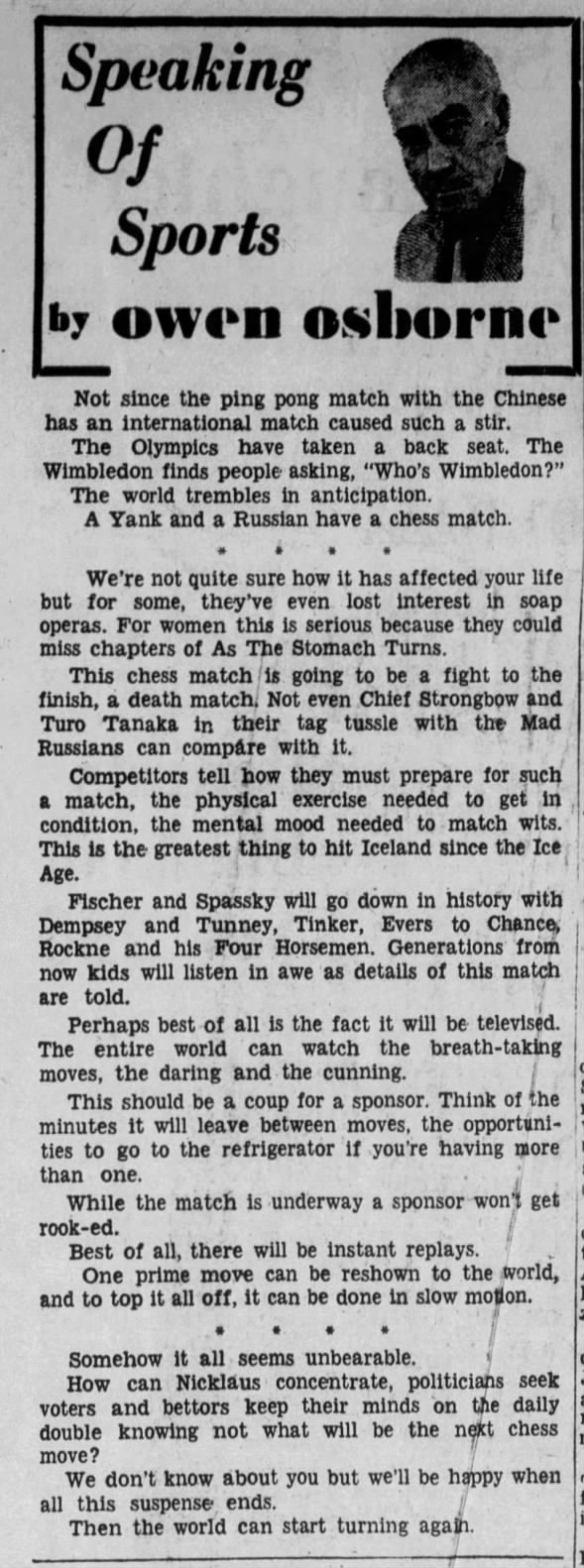 Speaking of Sports 06 Jul 1972, Thu The Bangor Daily News (Bangor, Maine) Newspapers.com
Speaking of Sports 06 Jul 1972, Thu The Bangor Daily News (Bangor, Maine) Newspapers.com
The Miami News Miami, Florida Thursday, July 06, 1972 - Page 51
Chess Match Starts Sunday
Reykjavik, Iceland — The chess match of the century between Boris Spassky and Bobby Fischer is on at last, with the drawing of lots tonight and play expected to start on Sunday. Tournament officials said the Soviet champion and his American challenger were expected to appear in person at the exhibition hall here tonight to draw lots to decide which shall play white in the opening game. Officials said that after Fischer had apologized to Spassky by letter this morning for missing last Saturday's opening ceremony, all problems holding up the much-delayed match had been satisfactorily resolved.
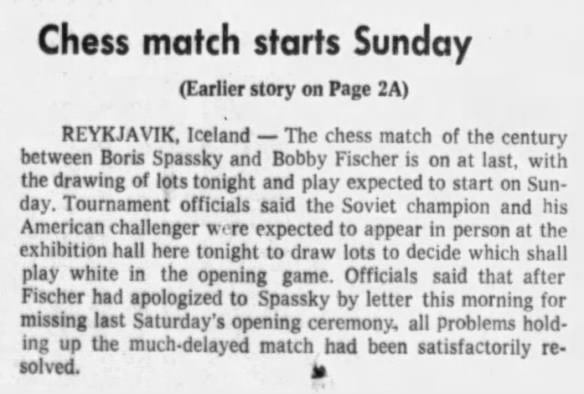 Chess Match Starts Sunday 06 Jul 1972, Thu The Miami News (Miami, Florida) Newspapers.com
Chess Match Starts Sunday 06 Jul 1972, Thu The Miami News (Miami, Florida) Newspapers.com





















